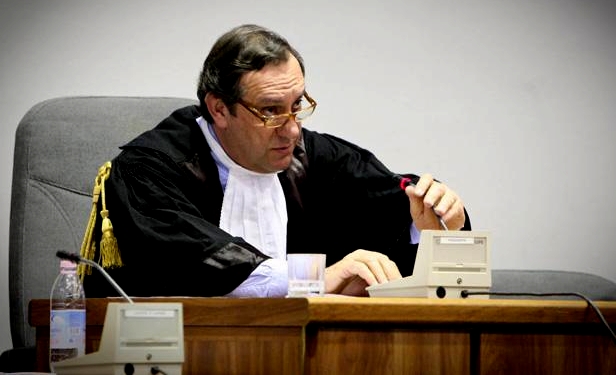
Headsup: The deep expose with associated comments below was first posted by Finn MacCool on 12/20/13. Knox's failed calunnia trial in 2009, failed 1st appeal in 2011, and failed final appeal in 2013 had come and gone. Some 500 zombie misrepresentations had recently reappeared in Knox's English-only 2013 book. See main support documents here and also (vitally) this and this and this.
Category: Various scenarios
Sunday, July 26, 2015
Why The Count Of Discredited Prosecution Witnesses Even Now Remains Down Around Zero
Posted by James Raper

As with all images on TJMK this image above will expand if clicked on
Just sifting through the latest drivel on Injustice in Perugia today and I came across this statement from one of their main posters.
“It was physically impossible for Capezalli to have heard any sounds from Meredith’s residence”.
Note : not that she was mistaken or that her evidence was unreliable but the bald statement that it was physically impossible for her to have heard anything.
Was she profoundly deaf then? If not, then why this assertion? Without some basis for this assertion then it is simply a dismissive slur on the credibility of the witness.
This happens to be the same poster who wowed that board with his claim that the Prosecution suppressed exculpatory evidence that would have cleared Knox and Sollecito.
Not that he supplied any proof. How could he?
It is axiomatic, of course, that if there was suppressed evidence then what it was would not be known. Nevertheless it was a ready springboard for calls from mindless idiots to have the Prosecution fully investigated and charged with perverting the course of justice!
Anyway, to move on, the purpose of this post is just to revisit (with pictorial assistance) Capezalli’s testimony (I shall call her Nara from now on) and see if there is even a scintilla of justification for the claim.
Now to be fair, Nara did say in her evidence that she had double glazing and maybe that is what he is referring to although for the life of me I don’t see why that would make it impossible for her to hear a scream outside.
But it’s worth investigating because it’s the sort of thing that does get repeated without further analysis and I have read others taking that remark at face value and doubting whether she did hear a scream and, perhaps more credibly, whether she would have heard the sound of someone running on the gravel of the cottage forecourt and up the metal steps from the car park.
Here is what she said -
“What happens is that getting up I’m going past the window of the dining room, because the bathroom is on that side, and as I am there I heard a scream, but a scream that wasn’t a normal scream. [A terrifying and agonising long scream as she describes it elsewhere] I got goose bumps to be truthful. At that moment I no longer knew what was happening, and then I went on to the bathroom. There is a little window with no shutters, none at all.”
Mignini then asks -
Q—Well, you go by the window and you hear this cry?
Ans ““ Yes.
Q ““ Then you continue to go towards the bathroom, you told me?
Ans ““ Yes.
Q ““ Do you open the bathroom window?
Ans ““ No.
Q ““ Explain what happened for us.
Ans ““ I haven’t any shutters on that window, I only have double-glazing so I can look straight out
Q ““ So you looked out of the bathroom window?
Ans”“ I didn’t open up because I had all the little succulent plants there for the light.
A little late in her testimony Mignini seeks to clarify her evidence -
Q”“ So you hear the scream, go to the bathroom, look out the window and you don’t see anything?
Ans ““ No.
Q ““ Then you go back to the bedroom?
Ans ““ Yes.
Q ““ When is it that you hear the noises you described, and then we will see what they are?
Ans ““ I hear the noises I described when I was closing the bathroom door, then I heard running, because that steel there [the metal stairs] makes a tremendous noise at night, then when you don’t hear cars going by or such like, I looked out but there was nobody there.
Q ““ From which way?
Ans ““ To the left and the right, and there was nobody there.
Q ““ Then you heard the scuffling?
Ans ““ The same, in the meantime I heard running on the stairs, from the other direction they were running in the driveway.
Much later Nara is helpfully (perhaps) cross examined by Dalla Vedova on her remark that she has double glazing, as follows -
CDV - How are your windows made?
Ans - My windows are made of wood. They have double glazing and they have a shutter.
CDV - When you say “they have double glazing” do you mean that every single window has two panes, or are there two windows, one in front of the other?
Ans - No, two panes in each side and opening in the middle.
Confused? What is she really describing?
Many moons ago Kermit put together a very helpful Powerpoint lambasting the behaviour and claims of Paul Ciolino, the American PI who appeared on CBS rubbishing the suggestion that Nara would have been able to hear anything. It is obviously Ciolino’s disreputable work that is the basis for the claim.
I am going to lift some stills from Kermit’s excellent Powerpoint and add to them some more from a (somewhat infamous) Channel 5 documentary, from which it will be clear that
(a) Nara doesn’t have double glazing, nor shutters, at least not at the back of her property overlooking the cottage. However there are shutters at the front and, for all I know, double glazing there but that is not of concern to us.
(b) There is little reason to doubt that she would have been able to hear sounds outside quite well.
Let’s start.
Here’s a picture of the back of Nara’s property immediately above the car park.
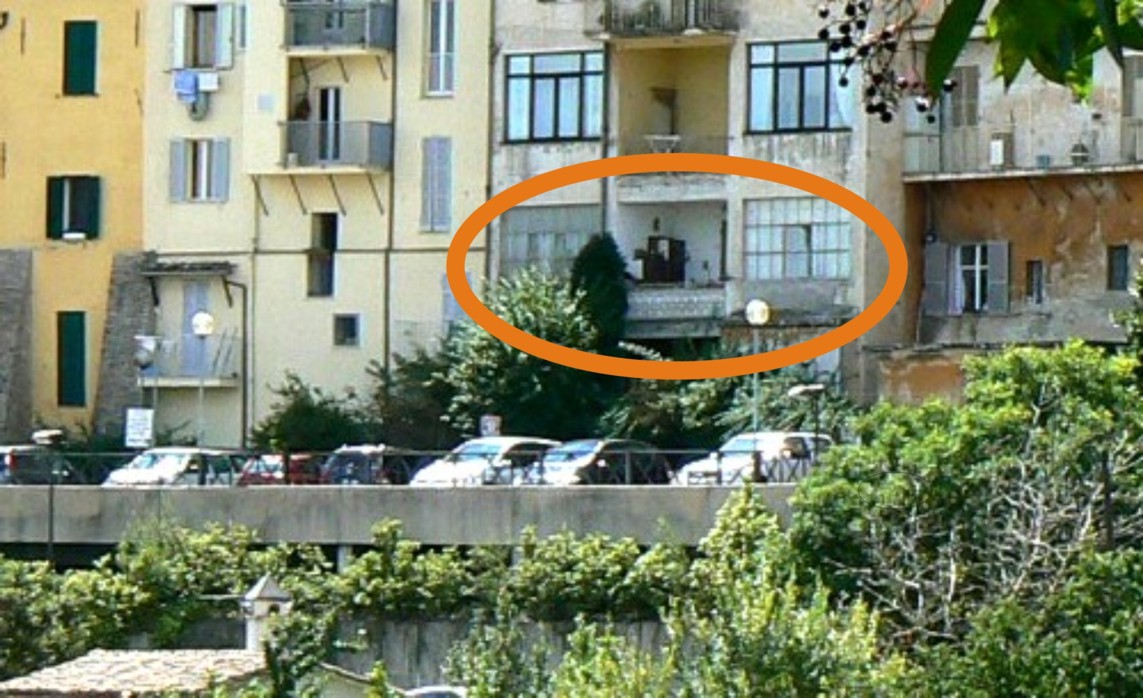
Here it is again in relation to the cottage

In the first picture Nara’s first floor flat is shown circled. In the second, it is obvious that only the roof of the cottage would be visible from the first floor, as indeed she said in her testimony.
There are two further floors above. The top floor is the one to which Ciolino (and Pater Van Sant) gained access, having tried but failed to interest Nara. Nara in her evidence said that there was an apartment above which she rented out and I suspect that this was the top floor. The top floor undoubtedly had double glazing or double casements.
Below is one of the top floor windows. (We can see Ciolino’s reflection in the glass)
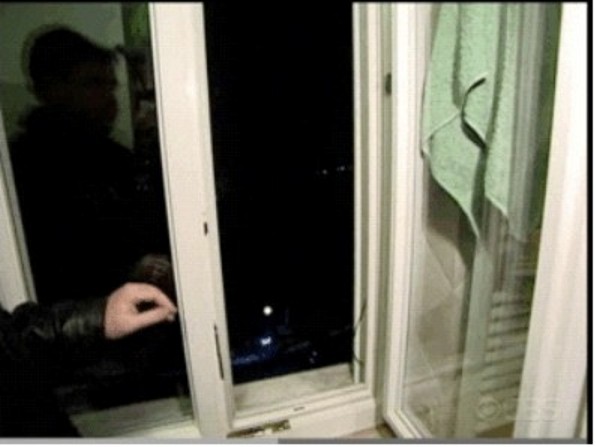
And here he is, standing in front of the same window whilst conducting his experiment with a couple of kids running along the road outside -
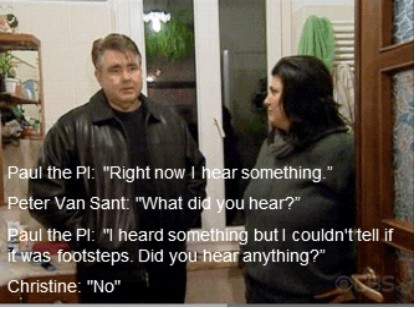
As we shall see it really was quite pointless conducting off-the-cuff sound experiments from there with the double casement shut tight
Nara said that her daughter also lived in the building so either the second floor was a separate conversion for her daughter or first and second were shared and the second was where their bedrooms were. That’s actually immaterial as it is the first floor that really interests us.
Here is a close up of the first floor. We can be sure because we can see Nara and the co-presenters of the Channel 5 documentary standing on the balcony.
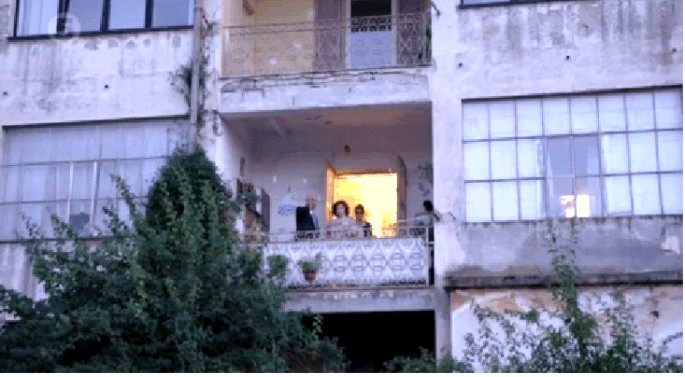
We can see how large the windows are on either side of the balcony. As to the window on the right it is also apparent that this has been blocked up save as to four panes in the middle so that now there is only that smaller window there.
Let us now look at that window from the inside.
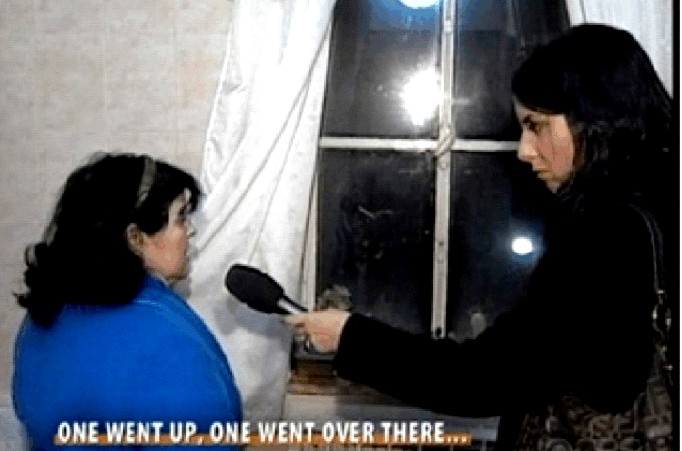
“One went up, one went over there” is Nara explaining to the Italian TV reporter the sounds she heard.
Clearly then she is standing inside her bathroom and the bathroom window looks over the car park. Indeed we can see her succulent plants on the inside window ledge as she stated in her evidence. Also, if we look closely, we can see that her wall is tiled or wall-papered with a tile design befitting a bathroom. Probably that wall is also made of little more than plasterboard.
One thing is quite certain though and that is that the window, which opens in the middle, is not double glazed.
Nara’s understanding however seems to be rather different. To her “double glazing” is (as she said to Dalla Vedova) “two panes in each side and opening in the middle”.
We can also infer that the large window to the left of the balcony belongs to her dining room. What she said, in effect, was that she was traversing the first floor (from left to right) from her dining room to her bathroom (being both on the same side, as she says). She heard the scream in her dining room.
The window there does not appear to be blocked off as it is to the right. Indeed I think we can see full length drapes or net curtains but certainly one would expect a larger window there and again, clearly, it is not double glazed.
So again, why would it be physically impossible for her to have heard a sound, particularly a scream, coming from the cottage?
It couldn’t be because it was too far away. We can see that from the pictures but also here is a handy GoogleMap calculation of the distance from her place to the far side of the cottage.
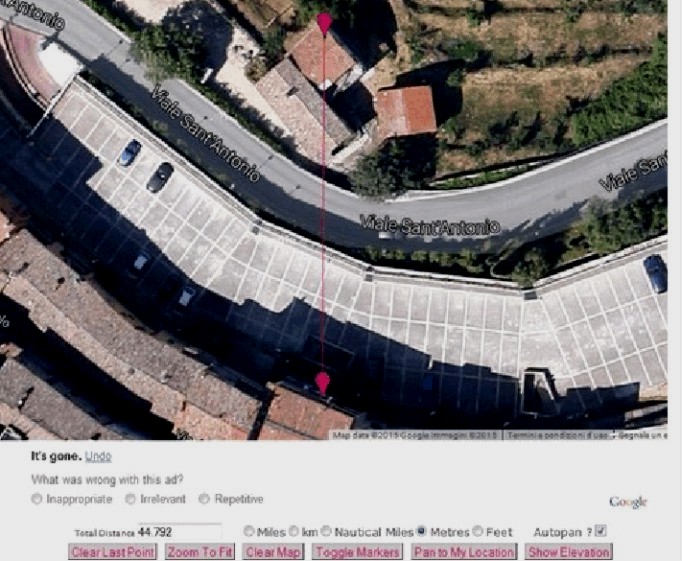
So that’s, say, 45 metres. Or 49 yards. Not far at all. Thanks to Yummi for bringing that up on pmf.org.
We should also remember that it was the 1st November which is a religious holiday in Italy in remembrance of the dead and therefore background noise was quieter than usual. It was also probably sometime around 11pm and the back of Nara’s property looks out on what is a natural amphitheatre in which noise will echo.
Nara Capezalli in fact came across as a compelling witness to what she heard that night and there is no way at all that it was physically impossible for her not to have heard that scream. Nor the metal stairs (”..makes a tremendous noise at night””¦.) just off to the right of her property and immediately below it.
On a personal note I was recently driven nuts by a manhole cover that had come loose in the road outside my bedroom window. Cars constantly drove over it and the noise kept me awake. The top floor of the car park would probably also act like a sounding board and the noise made by the stairs may also have come up through the stairwell we see immediately in front of her property. I am not so sure about the sound of gravel on the cottage forecourt being crunched underneath but already I am more than prepared to believe Nara on that score as well. Why not?
Finally, as we await the Cassation Motivation (whenever!) I seem to remember that at least one appeal point was the failure of the lower courts to accede to a defence request for audio tests to be conducted from Nara’s property.
Bearing in mind that Judge Marasca reportedly has stated that the ground for overturning the Nencini convictions was insufficient and contradictory evidence one wonders whether Cassation will say that a test was required, in the absence of which Nara’s testimony can be thrown into a pot along with other evidence somehow deemed “insufficient”?
If they do then watch out for them getting the double glazing issue quite wrong as well.
Sunday, July 05, 2015
Our Conclusions In “Deceit” & “Dark Matter” And How Our Journey Took Us To Them
Posted by Nick van der Leek
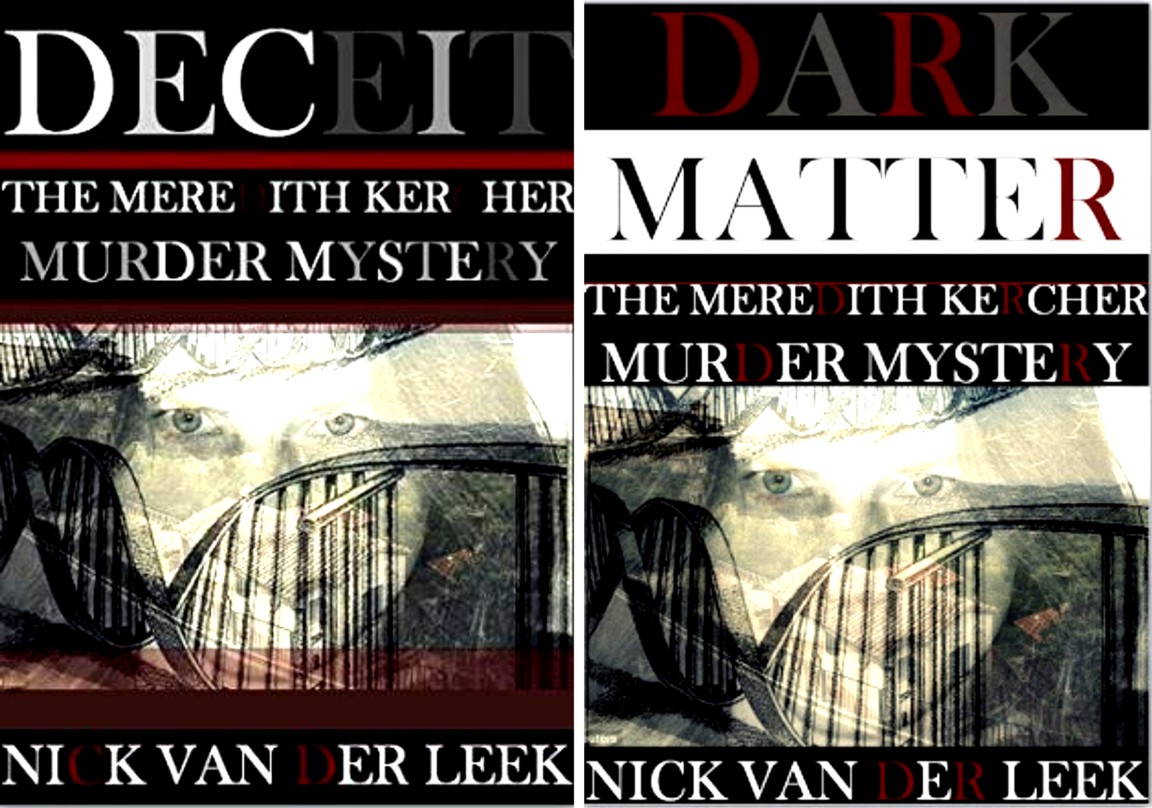
Albert Einstein once said, “It’s not that I’m so smart, it’s just that I stay with problems longer.”
One of the tremendously rewarding experiences we [my co-author Lisa Wilson and I] have as authors is our research forces us to set up camp around questions. We spend time: mornings, afternoons, days, weeks, even months asking questions and pursuing answers. The amazing thing when it comes to True Crime, especially popular crime, is those answers are out there. One merely needs to go out and make the effort to look for them. And keeping looking. Seek and we do find!
What makes our narratives distinctive, I think, is that Lisa Wilson and I more often than not work as a team. How many other narratives have two authors, working from opposite sides of the Atlantic? While Lisa provides a US perspective as a juror and a True Crime buff, I am more interested in the intuitive subtleties that underlie these cases. The psychology, the economics, the motives. Human behaviour is fascinating, especially when it drives people to the extreme. I’m also intrigued by what these intuitions reveals about us, and society.
I wasn’t always into True Crime, in fact like Ann Rule I sort of fell into it by accident. While Rule worked with Ted Bundy, I was facebook friends with the model Oscar Pistorius shot dead in his bathroom. I didn’t intend to write a novel, I simply started asking questions, and then penned a 12 000 word magazine article [intended as a 4 part series]. That narrative eventually became my first bestseller.
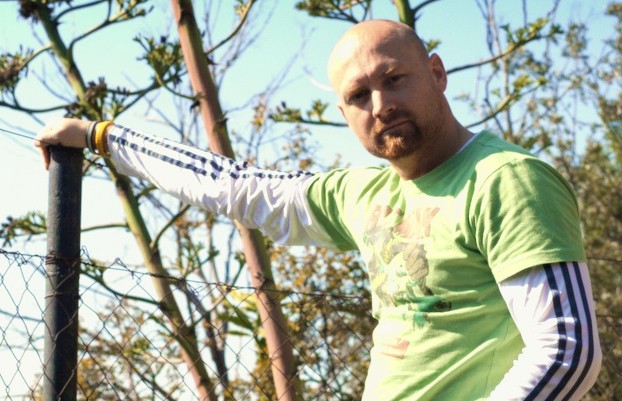
Although I studied law and economics, I left the corporate environment to freelance fulltime as a photographer and writer. My great grandfather was a famous South African artist, and my brother and aunt are also both well regarded artists [and yes, freelancers] in their own rights too. I guess there is something restless in my blood that makes we want to dig beneath the surface, to see expanded perspectives than what the media serves us.
I need to not only explore the world beyond my door, but represent it to myself and others in a constructive and meaningful way. I feel passionate about meaning above all, and it’s gratifying to find so much in so grim a setting where someone has lost their life. When we honour them, when we remember them honestly, something unexpected happens: we also set ourselves straight, we also get ourselves [and society to some extent] back on track.
In terms of the Amanda Knox case, I stepped into the bullring for the first time in April this year. I knew virtually nothing about the case other than it had been newsworthy around the world. I knew “˜something’ had happened in Italy, and that Amanda Knox was somehow involved [or not] because she was a housemate of a murdered British girl [also a student]. Before I started studying the case I had no bias either way ““ I didn’t know whether she was guilty or not. Based on the little media that came my way, there seemed to me to be equal parts bias that she was innocent and”¦suspicion.
As soon as I started examining the case, literally within a few minutes, my interest was aroused. It was along the lines of: she’s hiding something. It was also along the lines that I thought Amanda might be involved in some way, complicit in some way, but probably not involved in the actual murder. How could she? Why would she?
Again, it is easy to ask these questions and then walk away from them without investing time in their answers. And when they do come they’re”¦well”¦stupefying.

While Lisa travelled to Italy to investigate this case first-hand, I started working behind-the-scenes on a narrative Lisa and I designed a framework for called DOUBT. The plan was that Lisa would return and then we would work on the narrative together. I got so caught up in my own research I started on the narrative and by the time Lisa returned from Italy DOUBT was done. Interestingly, Lisa still wasn’t convinced of Amanda’s guilt when she got back, and we had one or two heated Skype calls while Lisa was still in Italy, where Lisa’s position was set to the default setting of most outsiders to the Amanda Knox case: “but there was no DNA.”
A lie repeated often enough eventually becomes if not the truth, then a kind of truism, doesn’t it? A truism isn’t the truth, it’s a platitude. It’s something you say to get rid of enquiring minds.
No DNA? Well, of course there is ““ at least five instances of it, mixed with Meredith’s blood. What’s perhaps more bizarre, for example, is the lack of Amanda’s fingerprints in her own home. A single print? How many of us could say the same about fingerprints in our own homes? Our computers, door handles, kitchen areas ought to be splattered with prints. Coming back to DNA, not only is Amanda’s DNA present, but so is Raffaele’s in Meredith’s bloody bedroom.
What is the chance that Raffaele was at the villa, in Meredith’s room, but not Amanda? What was he doing there if Amanda wasn’t with him? And is it any surprise that Meredith’s bra, cut with a knife after the murder also had Raffaele’s DNA on the bra clasp? This is a guy who had a knife fetish, and who was carrying a knife at the time of his arrest?
In DOUBT [which was banned at first by strident Pro Knoxers and then resurrected as DECEIT] I identified 28 Red Flags. These were singular signals that seem to show patterns of inconsistency. Things just didn’t add up. Indeed Amanda did seem to be [and still is?] hiding something. In DARK MATTER Lisa and I joined forces. We brought a binocular lazer-like narrative focus to the four days of intense police investigation following the discovery of Kercher’s body at midday November 2nd, 2007.
In DARK MATTER we identified an additional 100 plus Red Flags [we distinguished these from the first 28 by calling them “˜Black Asterisks’]. In addition to these we listed several other Highly Suspicious Events amongst other increasingly odd behaviours ““ not only from Amanda, but Raffaele as well. It is when we pool all of these clues together that a picture begins to emerge. Patterns emerge. And suddenly the mystery becomes”¦less mysterious.
If my initial “˜gut feel’ was that Amanda was simply “˜hiding something’, by the end of DECEIT there was little doubt that there was a lot more going on than that. In fact, I’ve suggested to Lisa that based on forensic evidence alone [if one threw away all the circumstantial evidence], Amanda would still a have a major case to answer to. Conversely, if one took the entirety of circumstantial evidence, including the on-again-off-again alibi, and simultaneously threw out [ie ignored] the totality of forensic evidence, Amanda would still have a major case to answer to. That’s my opinion. Lisa’s too, now that she’s gone beneath the surface of this case herself.
The irony is this case is so large, so convoluted, so filled with spin and counterspin, that it is easy to get lost in the details. As we see so often in court cases, it is not a lack of evidence that is a problem, it is the volume of it that gets disconcerting, and frequently confusing. Confusion and doubt [and “˜reasonable doubt’] go hand in hand. Of course being confused by a lot of information is not the same as uncertainty based on a lack of evidence, or based on ambiguous evidence. The evidence isn’t ambiguous.
As such it is Lisa’s and my mission to demystify the eight years culminating in Amanda’s and Raffaele’s ultimate acquittal. Our narratives, especially the first two or three in the series are probably better suited to newbies [people like us]. In THE IVORIAN, and the many narratives to come after that, Lisa and I expect to be as well versed as some folks on forums and resources like the incredibly valuable True Justice.org.
Before wrapping up, I’d like to share a final insight based on our experience writing another true crime series. It may seem like Amanda Knox, Jodi Arias and Oscar Pistorius are three distinct individuals, with nothing in common. But when we look closer we don’t simply see matches in certain defense schemes, we see entire patterns of conduct [including motive] overlapping, and doing so perfectly.
In South Africa we have a similar situation where the media profit out of stories on Oscar Pistorius. They are reluctant to declare him guilty as that would be slaying a potential “˜cash cow’, and with book deals hanging in the balance [an acquittal is literally worth millions], the media are hedging their bets.
As a person involved in the media I am appalled at this, hence our eight narratives on Oscar, two detailing his motive and the method of what we speculate was premeditated murder. In terms of Amanda Knox, we suspect a similar game play between the media and Knox. Both seem to be involved in a kind of PR waltz which both stand to benefit from, if they can dance consistently to their own music.
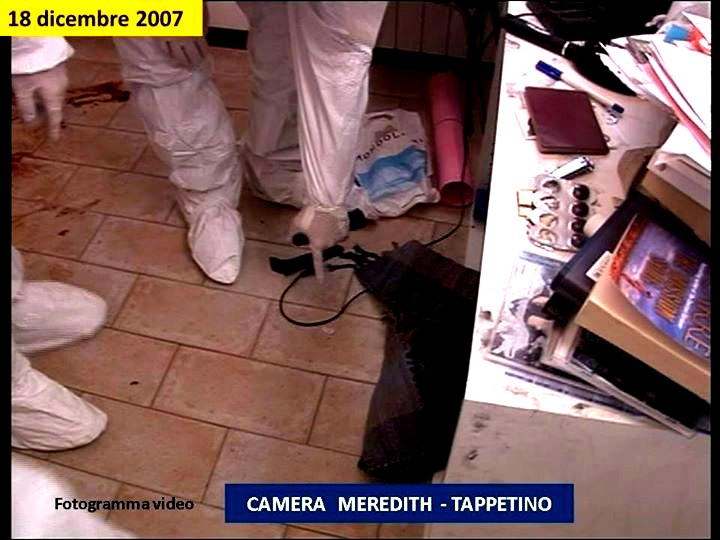
It was once said of Lance Armstrong that one shouldn’t make Lance Armstrong angry. Anger is what motivates Lance to win. And then the punch line: “˜Beating Lance makes him angry.’ Lisa and I have been astonished at the level of organisation and aggressive militancy [and dirty tricks] employed by Amanda’s supporters. If this was intended to dissuade us from writing, these folks couldn’t be more wrong.
We are not out to make money, Lisa and I, although we care that our narratives resonate and are successful. What we really care about is justice. The bottom line, whether one is a criminal, or the supporter of a criminal is you never look good trying to make someone else look bad. The venom and personal insults Lisa and I have endured in our reviews is impressive. The strategy is clear ““ attack the credibility of the messenger [since the message itself is problematic].
Our credibility is simple to establish. For my part, I am a professional writer. I did not gain a twitter following of almost 14 000 based on bad writing. I write in partnership with Lisa because her research is often deeper and even more thorough than mine. For me our credibility is based on just two tests: our personal standards and our level of honesty towards ourselves and others. What distinguishes our narratives from all the others out there is the level of honesty ““ including self disclosure ““ both of us bring to our work.
This is because we care about something beyond justice. Besides wanting our readers to have a meaningful and genuine experience reading about these tragic crimes, we ““ as authors ““ also want to be enriched. When we make it a personal journey, the insights and intuitions are truly rewarding. We find how these folks ““ not only the victim but also the perpetrators ““ are not so very different from us. In this sense, if when we genuinely learn something from these true stories, Meredith Kercher’s death need not be in vain.
Follow Nick van der Leek on twitter @HiRezLife and Lisa Wilson at @lisawJ13
Please “like’ Nick van der Leek’s Facebook page.
Thursday, May 21, 2015
Those Pesky Certainties Cassation’s Fifth Chamber May Or May Not Convincingly Contend With #3
Posted by Cardiol MD

Media staff waiting in front of the Supreme Court
1. This Series’ Foreboding Context
On March 27th, 2015 Cassation’s Fifth Chamber announced that it had decided that Amanda Knox and Raffaele Sollecito were not guilty of the November 2007 Murder in Perugia of Meredith Kercher.
The Fifth Chamber is but one of Cassation’s more than 75 Panels. It’s reporting Judge is Antonio Paolo Bruno. He mas dismissive of the massive evidence. He was quoted as having said that the trials had “not many certainties beyond the girl’s death and one definitely convicted.”
Posts #1-#2 addressed the fact that, contrary to Judge Bruno’s pronouncement, the trials had Many Certainties, listing them under 30 enumerated Headings, but in total, there were many more Certainties and Certainly-Nots, listed in sub-headings.
The existence, timings, durations, and general locations of All the telephone calls are Certains, or Certainly-Nots. They bring the Total up to Many; Many more than 30; Certainly Not “not many”, as Judge Bruno asserted, Inappropriately, Deceptively, and Prejudicially.
Note the distinctions between when, and where Message-Received, and -Sent, versus When, Where and Whether Message-Read, e.g. Knox was near the Women’s Villa when her Telephone received Lumumba’s crucial message, but allegedly at Sollecito’s Flat when she First-Read his message. In Knox’s officially reported Q&A Testimony there was Confusion and Ambiguity over this issue, exploited to Knox’s advantage
2. Certainties 31 to 42
31 THE FINAL FATAL SEQUENCE
Details of the Fatal Sequence have been masked, over the years, apparently for humanitarian considerations, but such details should be available to readers who wish to more-objectively assess culpability. Here is what we have deduced:
Massei disagreed with the Reconstruction proposed by the Prosecution, which depicted Meredith on her knees, facing the floor:
a. Massei concluded that Meredith was in a standing position, facing her attackers:
MASSEI PAGE372-373: “”¦considering the neck wounds sustained, it must be believed that Meredith remained in the same position, in a standing position, while continuously exposing her neck to the action of the person striking her now on the right and now on the left. Such a situation seems inexplicable if one does not accept the presence of more than one attacker who, holding the girl, strongly restrained her movements and struck her on the right and on the left because of the position of each of the attackers with respect to her, by which it was easier to strike her from that [ End of p372; Start of p373: ] side. “¦”
b. Meredith’s autopsy was performed by Dr. Luca Lalli, but his detailed findings are not included in Massei’s report, they await their Translation into English.The Massei report includes only a limited paraphrase of Lalli’s findings.
32 CERTAINTY ONE re FINAL FATAL SEQUENCE
In “Darkness Descending - the Murder of Meredith Kercher” Paul Russell (Author), Graham Johnson (Author), and Luciano Garofano (Author) give clearer, more detailed descriptions of Dr. Lalli’s findings than Massei does.
On pages 72-74 of DD it emerges that the cut (Stab A) made by A large knife in Meredith’s neck was on the left-side, ran obliquely from left-to-right, almost parallel to her jaw, and slightly Upwards.
33 CERTAINTY TWO re FINAL FATAL SEQUENCE
DD does state that the knife entered 8cm vertically below her left ear, 1.5cm horizontally towards the front of her neck, but does not specify the cut’s length.
34 CERTAINTY THREE re FINAL FATAL SEQUENCE
A large knife created a gaping wound, visible only through the opened-skin of the Left-Side, continuing its travel under the skin, traveling across the mid-line plane, towards the right-side, exposing the oral cavity, fatty tissues and throat glands. Important jaw muscles were also severed.
35 CERTAINTY FOUR re FINAL FATAL SEQUENCE
As DD states, there was another stab wound (Stab B) on the right-hand side of Meredith’s neck, 1.5 cm long, penetrating 4 cm subcutaneously.
36 CERTAINTY FIVE re FINAL FATAL SEQUENCE
Stab B was made by a Knife smaller than the above large knife.
37 CERTAINTY SIX re FINAL FATAL SEQUENCE
The wound was shallow, did not create a gaping wound, did not cut important subcutaneous structures, but did create a route to the exterior through which blood from Stab A, then created by the large knife on Meredith’s left side could also exit to Meredith’s right side.
38 CERTAINTY SEVEN re FINAL FATAL SEQUENCE
g. The large knife had damaged no significant vessels of the Left-Side.
39 CERTAINTY EIGHT re FINAL FATAL SEQUENCE
i. Blood also flooded the subcutaneous tissues around the breech in the right-hand side of Meredith’s airway caused by the knife-stab on the left-side of her neck.
40 CERTAINTY NINE re FINAL FATAL SEQUENCE
j. This resulted in Meredith’s inhalation of her own blood.
41 CERTAINTY TEN re FINAL FATAL SEQUENCE
k. Meredith stops screaming, but now her blood seems to be everywhere, including over her attackers, and they quickly abandon her, already evading the accountability they are fully aware is theirs.
42 CERTAINTY ELEVEN re FINAL FATAL SEQUENCE
l. As DD comments, during Meredith’s Autopsy surprise was expressed that the Jugular Veins and Carotid Arteries (of both right and left sides) were intact.
Others who read about this murder, had concluded-then that the killers must have known about the major blood vessels (MBVs), but not about branches-of-Carotid-branches such as little RSTA.
3. Plus Beyond Reasonable Doubts
BEYOND ANY REASONABLE DOUBT ONE re FINAL FATAL SEQUENCE
c. Accepting Massei’s conclusion, Knox and Sollecito were standing-up and facing Meredith in Meredith’s room. Knox, Sollecito and/or Guede, were participating in the restraining of Meredith.
BEYOND ANY REASONABLE DOUBT TWO re FINAL FATAL SEQUENCE
d. Sollecito (or Guede) was holding the smaller Knife, probably in his right hand. This smaller knife made Stab B.
BEYOND ANY REASONABLE DOUBT THREE re FINAL FATAL SEQUENCE
Stab B preceded Stab A, and caused Meredith’s scream.
f. When Meredith screams Knox plunges Knife36 into Meredith’s neck in the above long-axis direction, from left to right, transecting Meredith’s Hyoid bone, first opening Meredith’s airway to the atmosphere, then transecting Meredith’s Right Superior Thyroid Artery.
BEYOND ANY REASONABLE DOUBT FOUR re FINAL FATAL SEQUENCE
e. Knox was holding Knife36, probably in Knox’s right hand, holding Knife36 against the left side of Meredith’s neck with Knife36’s point directed slightly upwards the right side of Meredith’s neck, the blade-label facing towards Knox, the palm of Knox’s right hand also facing towards Knox and the long-axis of Knife36 angled a few degrees above horizontal.
BEYOND ANY REASONABLE DOUBT FIVE re FINAL FATAL SEQUENCE
f. When Meredith screams Knox plunges Knife36 into Meredith’s neck in the above long-axis direction, from left to right, transecting Meredith’s Hyoid bone, first opening Meredith’s airway to the atmosphere, then transecting Meredith’s Right Superior Thyroid Artery.
BEYOND ANY REASONABLE DOUBT SIX re FINAL FATAL SEQUENCE
h. A thin stream of bright-red blood spurted from this artery to its exterior environment, probably through the cuts made in her skin to the outside by both knives.
(Consistent with bleeding from both cuts, Follain, in his book “A Death In Italy” states that Guede saw that blood was coming out of the left side of Meredith’s neck. Follain also states that Francesco Camana of the Rome forensic police, in Camana’s written report, that spurts of blood in the middle of Meredith’s chest made her sweatshirt more bloody on the right side than on the left side)
BEYOND ANY REASONABLE DOUBT SEVEN re FINAL FATAL SEQUENCE
i. The large knife was Knife-36, which had been brought to the murder room from Sollecito’s kitchen.
This series continues here.
Wednesday, April 08, 2015
In Big Complication For Cassation Guede Demands New Trial To Prove He Was Not “Accomplice Of Myself”
Posted by Peter Quennell
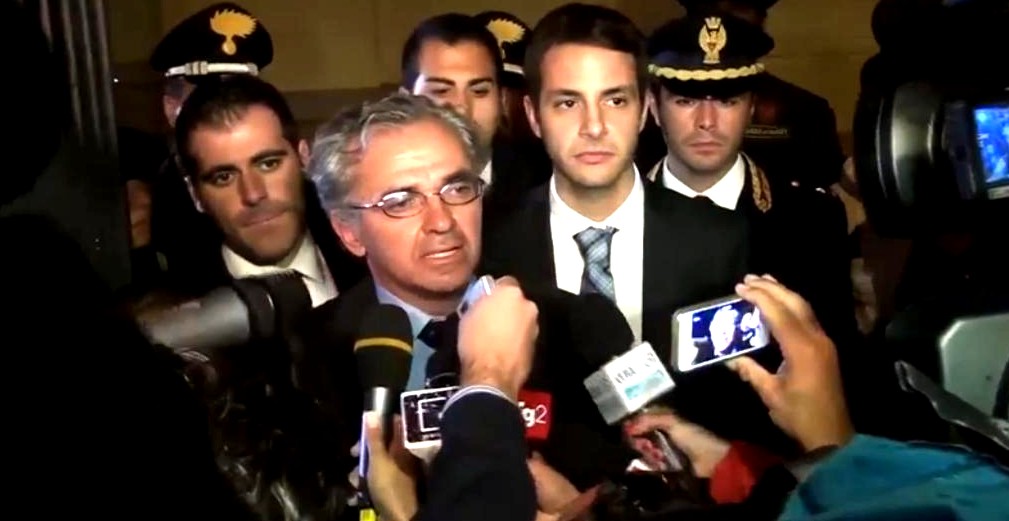
Above: Rudy Guede’s smart lead lawyer Walter Biscotti on another high profile case
The Fifth Chambers of the Supreme Court was the one that allowed Knox and Sollecito to walk free.
Sooner or later they must explain. Initial statements of their reasons has many Italian justice officials in strong disbelief.
If there were evidence problems (and we know of next to none and hundreds of evidence points suggesting guilt) the Florence appeal court was the correct court to put them to bed. Cassation has no legal mandate for that.
It gets worse. Somehow the Fifth Chambers has to explain why the First Chambers ruled the other way on some very key points in 2010 and 2013 and why it confirmed Knox’s sentence for the felony of calunnia with no further possibility of appeal.
It gets worse. The five judges would seem to have to come down for either the highly discredited Lone Wolf Theory or for two other “missing killers” (for which there is zero evidence) to have attacked Meredith.
From 2007 to 2015 two defense teams tried very hard but without conviction or success to do both of those things - even though Guede and his defense had no way to answer back as they were not even in court.
Those same two teams tiptoed away from much of the pesky evidence against all three which they were simply powerless to explain.
So Guede’s demand for a new trial reported today could not be timed worse from the Fifth Chambers judges’ point of view.
Chances are that this request will be ruled on by another Chambers of Cassation. It might take some time but they might have no compunction (especially if they are the First Chambers) about hanging the increasingly embattled Fifth Chambers out to dry.
No way Guede’s conviction ever gets reversed. He knows that. We all know that. The evidence is way too strong. But Guede could really rub it in that he was not the initiator of the 15-minute attack and could certainly not have done it alone. That he had no motive at all. That he was not a drug dealer or a burglar - no evidence for either exists.
That he was not the one who had a reason to clean up the house as his own trial ruled. And that he did not wield the final blow.
*****
Added to the top post on Thursday, and amended Friday.
It looked briefly like his lawyers contradicted Guede. But legally Guede is the one with much at stake and gets to call the final shots.
And Biscotti merely added that while he didn’t know exactly what Rudy said, his words should not be considered as a public statement, he did not intend for them to go public.
Of course, Biscotti would want to keep their powder dry, and keep Guede out of harms way, and keep all possible options open in Cassation.
Smart legal, safety and financial tactics.
Tuesday, April 29, 2014
Why Final RS & AK Appeal Against Guilty Verdict May Fail: Multiple Wounds = Multiple Attackers
Posted by Our Main Posters
Reports From Italy On Why AK & RS Appeal Failed
The Nencini Report has been released and we are seeing to its translation right now.
Meanwhile journalists in Italy have these reports which convey the very implacable, damning tone. There was nothing accidental about Meredith’s death; Knox premeditated it all along.
First report
From Il Messagero kindly translated by Miriam:.
FLORENCE - The knife that was seized at Raffaele Sollecito house is the knife that killed Meredith Kercher, and the blow was delivered by Amanda Knox. So writes the President of the Court of Appeal of Florence, Alessandro Nencini, in the motivation report of the sentence that was passed on Jan. 30th that saw Amanda Knox sentenced to 28 and a half years and Raffaele Sollecito to 25 years.
Over 330 pages in which the court covers the appeal and explains the conviction. Starting with the knife considered “not incompatible with the wound that was carried out on Meredith Kercher. “In the present case, writes Nencini what counts is the accessibility of the weapon by the accused, it’s concrete portability from house to house, it’s compatibility with the wound, and the presence of Meredith’s DNA on the blade. All of these elements ascertained by the court lead to the conclusion that the knifed evidenced as no. 36 was one of the knifes used in the attack, and was the knife that Knox used to strike the fatal blow to Meredith’s throat.”
The court retains to have sufficient evidence of “certain reliability” of Rudy Guede (convicted to 16 years) Amanda and Raffaele in the house where Mez was killed, on the night between the 1st and November 2, 2007 in 7 Via della Pergola “in the immediate phases following the murder.” The Court then tells how she was immobilized and Mez “was not able to put up some valid resistance because she was dominated by multiple assailants and cut at the same time with the blades of several knives.”
Rejected therefore is the defense’s strategy of both of the convicted, that have always maintained that the killer was only one.: the Ivorian Rudy Guede.
Second report
Bullet points from various Italian media.
- The big knife from Sollecito’s house held by Amanda Knox caused the fatal wound to Meredith while the other was held by Raffaele Sollecito.
- There is strong “multiple and consistent” evidence of all three in the house immediately following the murder. All three worked to suppress Meredith.
- There was an escalating quarrel between Knox and Meredith leading to a progressive aggression and murder with sexual components.
- Between Amanda and Meredith there was no mutual sympathy and Meredith harbored serious reservations about the behavior of AK.
- The biological trace found on the bra clasp that Meredith Kercher was wearing the night she was murdered was left by Raffaele Sollecito
Third report
No especially accurate reports in English have appeared yet and the erroneous “new trial” is still surfacing. Andrea Vogt tweets that she will be posting an analysis soon.
The mischievous defense-inspired “sex game gone wrong” and “satanic theory” mantras are still widely showing up in the duped media, but are nailed hopefully finally in this new report.
Judge Nencini has closely followed and endorsed the “from all angles” Massei trial analysis, but with the inclusion of some more credible explanations from Prosecutor Crini which Judge Micheli had also espoused back in 2008.
In particular, Rudy Guede is not now highly improbably seen as the one initiating the attack on Meredith, and sex was not at all the primary driving force for the attack (the prosecution never ever said it was). Knox carried the big knife from Sollecito’s for a purpose.
The bad blood between the girls resulting from Knox’s crude, brash, very lazy, drug-oriented behavior was well known in Meredith’s circle. All of them had backed away from her, as also had her employer and the patrons in his bar.
There was a probable theft of money by Knox who was unable to account for a sum similar to what Meredith would have stashed away for the rent and that is seen as the probable spark for the explosive argument and attack.
Fourth report
Barbie Nadeau in The Daily Beast
Amanda Knox apparently did not kill Meredith Kercher in a “sex game gone wrong,” as had been previously decided by a lower court in Perugia, according to a Florentine appellate judge who released today a 337-page document explaining his decision to convict Knox and her erstwhile Italian boyfriend, Raffaele Sollecito, for Kercher’s murder. Rather, the judge claims, Knox allegedly killed Kercher, her 21-year-old British roommate, because she didn’t like her.
All Italian courts require judges to explain the reasoning behind their rulings, and it likely represents the penultimate step in a seven-year case that has seen Knox and Sollecito first convicted in 2009 then acquitted in 2011 then convicted again in January 2014. Rudy Guede, an Ivory Coast native who was also convicted for his role in the murder back in 2008, is serving a 16-year jail sentence. He is currently eligible to apply for work furloughs from prison.
Judge Alessandro Nencini, along with a second judge and six lay jurors, were tasked with hearing a second appeal that began in September 2013 after Italy’s high court threw out the acquittal that set Knox and Sollecito free in 2011. Italy’s high court cited “inconsistencies” and “legal mistakes” and tasked Nencini’s court with hearing the appeal again. It was not a retrial per se, but rather a fresh look at the appeal process that freed Knox.
Nencini decided that the appellate court that set Knox free erred in evidentiary and legal matters. That court will now have to rule definitively on the case, using Nencini’s reasoning and whatever appeal Knox and Sollecito file for their final judgment. If the high court accepts Nencini’s verdicts, the two will be required to serve their prison sentences in Italy. Knox has vowed she will not return to Europe, but Sollecito, unless he escapes, won’t be as lucky.
The court’s explanation of its decision comes down hard on the first appellate court that overturned Knox’s guilty verdict, at times seemingly scolding them for misapplication of penal codes and for throwing out witness testimony without explanation. “It was an operation of evaluating evidence with using logic,” Nencini wrote, accusing the first appellate court of essentially throwing out testimony that allegedly proved Knox’s involvement, but keeping testimony that supposedly supported her innocence.
He used Knox’s prison diary as a prime example. “Look at the contradictions in the evaluation of the diary written in English by Amanda Knox,” he wrote, referring to a handwritten prison diary taken fromKnox’s cell as part of the investigation to determine why she accused her pub boss Patrick Lumumba of Kercher’s murder during early interrogations. “On one hand, the appellate court of Perugia completely devalued the writings when she admitted wrongdoing by accusing Patrick Lumumba. On the other side, they valued it when she defended herself.”
Nencini also ruled that there was plenty of forensic evidence tying Knox and Sollecito to the crime scene, writing “they left their tracks in the victim’s blood” more than once in the document. He accepted testimony that supported the theory that a knife found in Sollecito’s apartment was one of the primary murder weapons, and he reasoned that a second knife was also used that matched a blood stain left on Kercher’s mattress.
The first knife in question was the only hard evidence reexamined in the second appeal, and forensic experts ruled that a previously untested spot on the knife’s handle consisted of 100 percent Knox’s DNA. An earlier court heard testimony that a tiny smidgeon of DNA on the groove of the blade was Kercher’s, but the first appellate court agreed with witnesses who testified that the sample was too small to be considered a perfect match. The second appellate court not only considered the knife to be the murder weapon, it also ruled that Knox “plunged the knife into the left side of Kercher’s neck, causing the fatal wound.”
The second appellate court also reasoned that Kercher’s bra clasp, which had been cut from her body after she was killed, had Sollecito’s DNA on the tiny metal clasp. “The biological trace found on the bra clasp that Meredith Kercher was wearing when she was assassinated belonged to RaffaeleSollecito,” Nencini wrote, agreeing with the judge in the original murder conviction. “The clasp was manipulated by the accused on the night of the murder.”
The court also scoffed at certain rulings laid out by the first appellate court, saying that the court’s reasoning that it would have been easy for “a young athlete” like Rudy Guede to scale the wall and enter the apartment, was borderline racist.
Nencini also ruled that with regard to motive in the murder, it was subjective and personal. “It is not necessary for all the assailants to share the same motive.”
The court picked out small details of Knox’s presumably errant testimony, including how she told police the morning Kercher’s body was found that Kercher always locked her door “even when she takes a shower,” which was later contested by the girls’ other roommates.
Nencini also clearly believed ample forensic testimony, presented by experts examining the original autopsy, that Kercher was killed by more than one person. “”She was completely immobilized when she was murdered,” he said, reasoning that Guede could not have acted alone, and instead likely held her back as Sollecito and Knox knifed her.
The judge also pointed out incongruences in Knox’s testimony about the night of the murder, but noted problems with the other witnesses, which included a homeless man, an elderly woman who said she heard screams. Still, he ruled that Knox’s accusation of Lumumba is vital evidence against her. “It is impossible to separate the two acts,” he wrote.
Using Nencini’s reasoning, Knox’s lawyers now have the roadmap for planning their final appeal to Italy’s high court, likely later this year or in early 2015. However, this same high court threw out the acquittal in the first place, so Knox may need more than luck to walk free. If she is definitively convicted, she will likely face an extradition order to come back to Italy to serve out her sentence. There are very few legal loopholes that would allow an American citizen to escape a court decision by a country, like Italy, that shares extradition treaties with the U.S.
[Judge Massei at crime scene; report says why Knox & Sollecito appeal against his 2009 verdict has failed]
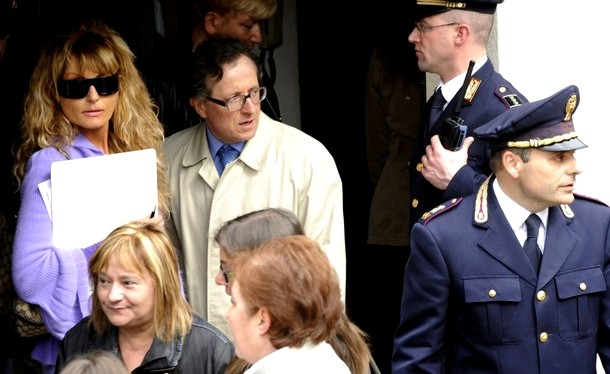
[The Supreme Court in Rome is expected later this year to confirm this outcome]

Saturday, February 01, 2014
Harvard Professor Alan Dershowitz And Philly Lawyer Ted Simon Both Claim The Devil’s In The Details
Posted by Peter Quennell
Alan Dershowitz sees plenty of evidence against Knox. He really has absorbed the key details, and in this case, the devil is in the details.
Alan Dershowitz has spoken out quite accurately a number of times on the case previously, and he shows great respect for the carefulness of the Italian system.
Philadelphia lawyer and Knox advisor Ted Simon also thinks there is a devil in the details. Or rather, he did back in 2008 (below) before he got on the Knox payroll and his foolish mantra became “There is no evidence”.
Wrong. There is stacks of evidence that Knox was in that room - and it wasnt even tested for DNA.
- Why was her lamp in the room? Why cannot she explain that? Why are there zero fingerprints? Who wiped them? Who moved Meredith’s body? How did Knox’s and Meredith’s blood get co-mingled? In half a dozen different locations? Outside a locked bedroom door?
- Why are there footprints in blood outside the locked bedroom door of both Knox and Sollecito? Why do Guede’s shoeprints head straight out the front door? And if Knox didnt start to rearrange the crime scene, who staged the break-in, and why?
- And why do the various presentations in closed court in 2009 (all-day testimony by crime-scene and autopsy experts and a 15-minute video recreating the attack) which proved THREE attackers still remain unchallenged?
Those pesky details…
Monday, January 06, 2014
Curious Parallels Between Scott Peterson And Amanda “I Am Not A Psychopath” Knox
Posted by giustizia

[Above: Laci Peterson and Meredith Kercher, the victims in the two cruel crimes]
1. The Violent Deaths Of Laci Peterson and Meredith Kercher
Laci Peterson was soon to give birth in California in December of 2002. On Christmas Eve, her husband Scott reported her missing. In April of the following year, her body and the body of her unborn son Connor were discovered in the San Francisco Bay.
Five years later, in Italy, on 2 November 2007, foreign study student Amanda Knox was at her rental home with her Italian lover Raffaele Sollecito in Perugia, Italy, when the postal police arrived early one morning to return some cell phones traced to her flatmates; the phones had been found dumped in a nearby garden.
Shortly after, the shocking discovery was made that her flat mate Meredith Kercher had been murdered.
2. Parallels Between Knox and Peterson In Their Personalities, Crimes And Court Cases
There is a number of striking parallels between the behaviors of Amanda Knox and Scott Peterson and their alleged crimes and convictions.
The horrific murders of two beautiful young women (one almost at the end of the full-term pregnancy of her first child) unleashed in each case a maelstrom of publicity rarely seen in search of the murderer.
When arrests were made, there also came the stunning revelation in each case that the accused was well-known to the victim ““ in Laci’s case, it was her husband, Scott Peterson; in Meredith’s case, it was her roommate, Amanda Knox.
Ultimately, three people were arrested for the murder of Meredith (as we know, the fourth person arrested, Patrick Lumumba, falsely accused by Knox as Meredith’s murderer, was released when his solid alibi was proven). Of the three people arrested for the murder of Meredith Kercher, evidence suggested to prosecutors that Amanda Knox was the instigator of the crime.
In each trial, the defendant presented a seemingly normal and middle-class appearance. Neither defendant had a significant history of violence or widely-obvious mental illness. Their families insist on their innocence.
Yet both were convicted of brutal murders (and both now fight their convictions on appeal).
Knox and Peterson were each described by casual acquaintances, neighbors and friends as nice, regular people.
Ann Bird, Peterson’s half-sister, described him as being “charismatic, charming, courteous, polite.” On Dateline NBC television, a friend of Amanda Knox described her as being “generous, kind, genuine, optimistic, bubbly. Pretty much all the good words that you can find in a dictionary, she was.”
But they proved superficial assessments that in fact really only scratched the surface.
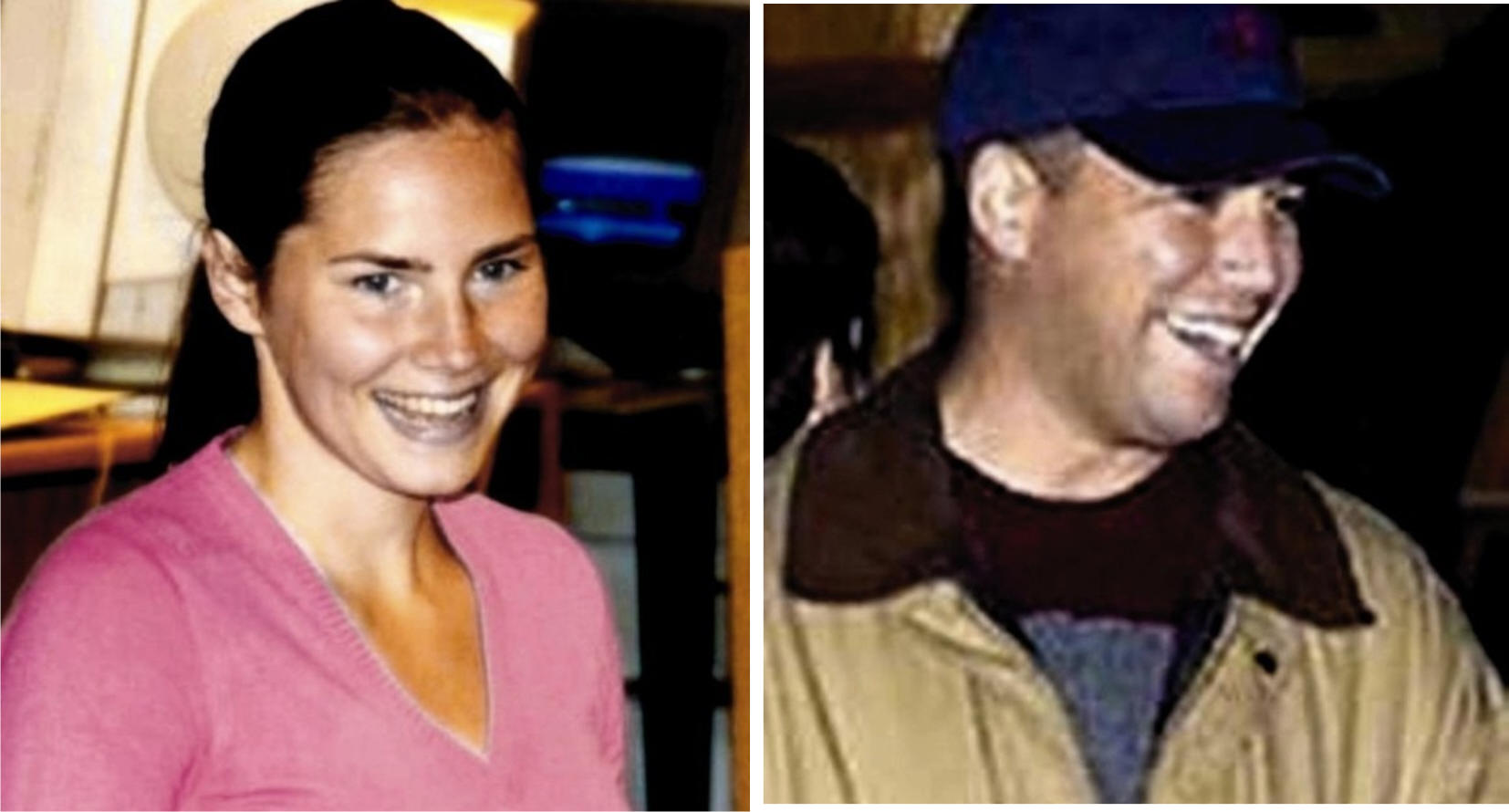
3. Reckless Odd Behavior And Lies By Amanda Knox
Amanda Knox had been cited and she had received a fine (a sentence which could have been more severe) for disturbing the peace and throwing rocks at a party in Seattle shortly before her departure to Italy.
Knox abruptly and without clear reason dropped a much-sought-after internship in Berlin, Germany, before arriving in Italy.
She posted a vignette on Facebook about a sexual liaison she had with a stranger, a middle-aged man, while on a train in Italy.
Her roommate Meredith had become increasingly disenchanted with the American flatmate who brought home different men without warning. “So she’s [Meredith] waking up in the morning and there’s someone making tea. And it’s, who are you again?” commented Meredith’s friend Brittany Murphy on the subject of Meredith’s unease at the strangers Knox brought to their rented Italian home.
Richard Owen, the Italy correspondent of the London Times in Italy, who has written multiple stories on the case, stated that Knox brought home “people who Meredith Kercher distrusted. Didn’t like the look of. It got to the point where she actually confronted Amanda about this.”
And Amanda Knox’s behavior after the Meredith’s murdered body was found in their rental home was more than atypical for someone who had their flatmate killed in such a horrific fashion in such close proximity.
- “As she put them on she swiveled her hips, pulled a face and said ‘hop la’ - I thought it was very unusual behavior and my suspicions against her were raised.” (Edgardo Giobbi, a police forensic scientist, testifying in court, describing Knox’s behavior just hours after the murder, after he handed Knox a pair of shoe-covers to prevent contaminating the evidence during a search of the house. Sky News, UK, May 30, 2009.)
- “While I was [at the police station] I found Amanda’s behavior very strange. She had no emotion while everyone else was upset. I remember one thing that really upset me. [Meredith’s friend] Natalie said, ‘I hope she wasn’t in too much pain.’ Amanda said, ‘What do you think? She fucking bled to death.’ At that point no one had told us how Meredith died.” (Robyn Butterworth, a friend of Kercher’s, testifying in court. London Evening Standard, Feb. 13, 2009.)
- “Their behavior at the police station seemed to me really inappropriate ... They sat opposite each other, Amanda put her feet up on Raffaele’s legs and made faces at him. Everyone cried except Amanda and Raffaele. I never saw them crying. They were kissing each other.” (Amy Frost, a friend of Meredith’s and a student at the University for Foreigners in Perugia at the time, testifying in court. The Independent, London, Feb. 14, 2009.)
- “My daughter was a Leeds student with Meredith in Perugia. They went out together on Halloween. When Amanda Knox was asked how she felt on 2 November, she said: “Shit happens”, which contrasts rather sharply with the contrived way she addressed the Italian court about “my friend Meredith”. (Marc Rivalland, in a letter to the editor of the Observer commenting on the Knox case. The Guardian, UK, 12/13/2009.)
- “They came into the shop at about 7 p.m. and were there for about 20 minutes. She bought a camisole and G-string. I heard her tell him that “˜Afterwards I’m going to take you home and put this on so we can have wild sex together.” (Store owner Carlo Maria Scotto di Rinaldi’s testimony in court about Knox and Sollecito’s behavior in his store, taped on closed-circuit TV.)
- “Knox and Sollecito were seen laughing as they hold up various G-strings. In one still shot taken from the footage, Raffaele is standing behind Amanda with his hands on her hips and his groin pressed into her. It was the same day as the candle light vigil memorial for Meredith, a few days after her murder.” (Excerpt from the book Angel Face by Barbie Nadeau.)
Perhaps the most controversial claim in the Knox trial was Knox’s accusation of Patrick Lumumba as the murderer of Meredith Kercher. Lumumba was placed under arrest and jailed for two weeks, until his solid alibi set him free.
Knox, who said nothing to help him during the two weeks Lumumba was incarcerated, changed her story after he was freed. She then claimed she was coerced by the police into making confusing statements. Knox’s entourage have made charges of human rights violations and anti-Americanism against the Italian justice system, though to date the U.S. government has refused to become involved.
- “He’s bad. He did it. He killed her”¦It was him, it was him, he was crazy, he killed her.” (Amanda Knox’s statements, according to police at the police station, accusing Patrick Lumumba of murdering Meredith Kercher. The Daily Telegraph, UK, March 6, March 21, 2009)
- “She was angry I was firing her and wanted revenge. By the end, she hated me. But I don’t even think she’s evil. To be evil you have to have a soul. Amanda doesn’t. She’s empty, dead inside. She’s the ultimate actress, able to switch her emotions on and off in an instant. I don’t believe a word she says. Everything that comes out of her mouth is a lie. But those lies have stained me forever.” (Patrick Lumumba, bar owner in Perugia and Knox’s boss. Daily Mail, UK, November 25, 2007)
4. Reckless Odd Behavior And Lies By Scott Petersen
Scott Peterson had all the appearances of an upwardly mobile middle-class white-collar worker. He was a salesman with a pretty wife and a baby on the way, and they owned a nice home in Modesto, California.
His friends and family described him as charismatic and friendly. But under the surface was a lifestyle filled with lies and mistresses.
Scott Peterson had hooked up with a mistress, Amber Frey, in November of 2002, leaving his pregnant wife home alone during the holiday season to see Amber Frey, with excuses of business meetings.
Peterson told Amber Frey that he was a widow, and also that he was traveling in France when he was actually in California - two of many false claims Peterson made to her.
- “I’m near the Eiffel Tower. The New Year’s celebration is unreal. The crowd is huge.” (Scott Peterson, from a taped telephone conversation to his mistress Amber Frey, telling her he is in Paris, when he is really in Modesto, California, about to attend a candle-light vigil for his missing wife. Dateline, NBC, 1/4/2005)
Shortly after Laci Peterson was reported missing, that candle light vigil was held for Laci. It was on New Year’s Eve.
- ”˜Three witnesses testified that Peterson’s behavior at the candle-light vigil seemed inappropriate for a worried husband. One woman said that he showed no emotion during the service and was grinning as he “socialized” with friends afterwards.’ (From The Murder of Laci Peterson, TrueTV.com)
The jurors were shown a photo of the grinning Peterson at the vigil at the trial as evidence. He called his mistress before and after the vigil ceremony, while Laci’s distraught family members tried to cope with the situation of their missing relative.
- “Scott came in with a great big smile on his face, laughing, it was just another day in paradise for Scott, another day that he had to go through the motions,” said one juror, Mike Belmessieri. “Scott had no emotion on his face. Scott was being Scott.” (Juror of the Scott Peterson Trial, commenting on his unusually cool demeanor in court. New York Times, March 17. 2005)
Shades of Amanda…
- “The cartwheels? This is Amanda just being Amanda. As her friends would say, it’s an Amanda thing.” (Edda Mellas, commenting on Knox turning cartwheels at the police station. The Guardian, UK, June 27. 2009)
- “I couldn’t help but think how cool and calm Amanda was. Meredith’s other friends were devastated and I was upset, but Amanda was as cool as anything and completely emotionless. Her eyes didn’t seem to show any sadness, and I remember wondering if she could have been involved.” (Giacomo Silenzi, Meredith’s Italian boyfriend who lived in the apartment downstairs from the murder. Metro.co.uk, November 18, 2007)
5. Parallels In Forensic Evidence
In both cases, there were no eye witnesses or “smoking gun.”
In Scott Peterson’s case, the ONLY piece of hard evidence was a single strand of Laci’s hair, found on pliers in Scott’s boat, which the defense charged as being contaminated evidence.
This and all rest of the evidence at his trial was circumstantial. Nobody witnessed any deed.
Both the circumstantial and forensic evidence in the Knox trial were more considerable. Key items of hard evidence included the knife found in Sollecito’s apartment that had Meredith’s DNA on the tip and Knox’s DNA on the handle, and it was accepted at trial as one of the murder weapons.
A bloody footprint, the size of Knox’s foot, was found on a pillow underneath Meredith’s body. Mixed DNA material of both Knox and Meredith were found in several spots in the house where the murder occurred.
6. Parallels In Strange Coincidences
Laci and Connor’s bodies were found in the water in the bay area of San Francisco. Scott Peterson happened to own a boat and liked to fish ““ in fact, he said he went fishing on Christmas Eve, the day Laci disappeared, at a location where later the bodies turned up only about 3 miles away.
Meredith was sexually molested, strangled, and ultimately killed by knife stabs. Raffaele Sollecito has a fascination with knives and he owns a large collection. Amanda Knox created and posted a fictitious story about a violent rape on the Internet.
Sollecito posted a photo of himself on the Internet swathed in bandages and holding a large meat cleaver and a jug of a chemical-looking liquid. Knox and Sollecito were the only ones at the house on the day when the police showed up and later discovered Meredith’s body.
The juries in both trials concluded that these factors were more than mere coincidences, and represented incriminating evidence of guilt of the crime.
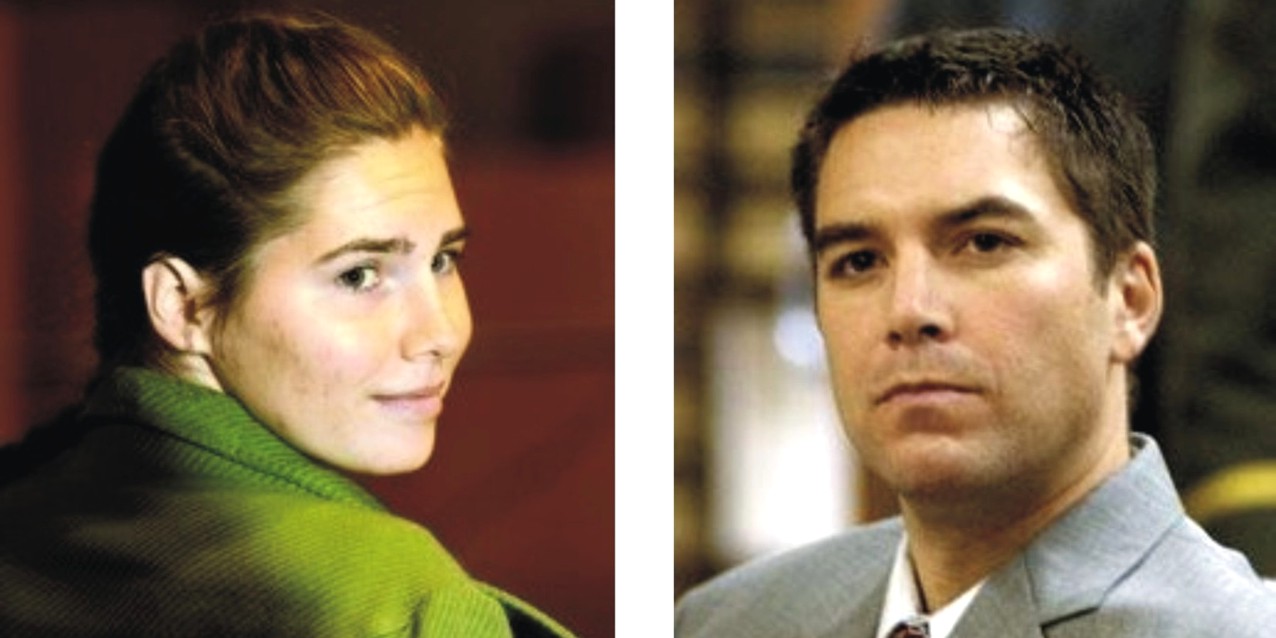
7. Parallels In How The Families Supported Their Children
Not all convicted murderers have a history of mental disturbance or violence. If there were any red flags regarding Knox’s and Peterson’s behavior, one would not know it from the descriptions provided by their families:
- ”˜Lee Peterson said his son never posed a discipline problem, did not rebel as a teenager and was a perfect baby. He was said even to lose golf games because he did not want to hurt the feelings of his opponents. ‘‘He woke up smiling and went to bed smiling.’’ (Scott Peterson’s father of his son, testifying to the jury after Scott’s guilty verdict but before sentencing. New York Times, December 2, 2004)
- “She was an incredible easy-going kid even from a baby. She was so mellow”¦She loved being read-to, she loved books. As she got a little older she always wanted to be outside - building camps, playing soccer. She never watched a lot of TV - she still doesn’t. She was an excellent student.” (Edda Mellas, commenting on Amanda Knox’s character the week of her guilty verdict. The Sun, UK, December 5, 2009)
8. Parallels In Family And Groupie Websites
Peterson and Knox’s families insist on their innocence. There are family and groupie websites for each convicted murderer. They each proclaim innocence for the guilty, make charges of police incompetence, and make requests for money for the defense cause and legal expenses:
- “Scott Peterson Family Mission Statement: “˜This web-site is a combined effort of our family and our support system. We know Scott is innocent and that he has been unjustly convicted. Our pursuit of justice for Laci, Conner and Scott remains steadfast. We want to keep you informed as to the specifics of the case, the appeal, and related topics. We also want you to know how grateful we are for your prayers and support.’ (From: http://scottpetersonappeal.org/)
- “Amanda Knox - A heartfelt thanks for your support. On behalf of Amanda and her family, we want to thank everyone who has contacted FOA to express their concern and to offer help in the wake of an unjust and unsupportable guilty verdict. We are developing a strategy to raise public awareness of this case and help bring about a reversal of the verdicts against both Amanda and Raffaele. Once it is in place, we will welcome all the help we can get, and we will be in touch with you.” (From http://www.friendsofamanda.org/home_eng.htmleartfelt)
Scott Peterson of course has never managed to get online. Amanda Knox of course runs a jubilant, taunting blog which trashes the memory of the victim and harasses her family - a first in global crime history and a foolish move given the current cold, remorseless rejection of her appeal.. Knox’s blog has a following among others also seemingly unable to succeed in normal ways.
9. Parallels In The Verdicts Jurors Delivered: Guilty As Charged
The jurors in each trial fitted together all the pieces of the puzzle: timelines, witness testimony, cell-phone records, forensic evidence, lack of solid alibis, incriminating lies, and odd behavior of the defendants.
They each concluded after lengthy deliberation that the defendants were guilty of murder.
10. And The NON-Parallels In How The US Media Has Reported Both Cases
Of these two cases, not many people have questioned the jury’s decision in the Scott Peterson trial. He has been sentenced to death via lethal injection, and he is currently incarcerated in San Quentin prison in California.
There are no repeated media interviews of Peterson’s mother in tears, insisting on his innocence and his release from prison. There are no angry declarations from Peterson family that the police, prosecution and legal system abused, railroaded and framed Scott Peterson.
If such media coverage were to exist, it would be widely considered in the US to be extremely upsetting and insulting to Laci’s parents and family and to the memory of the victims Laci and Connor.
Peterson’s media coverage, thankfully, has dissipated. He still pursues an appeals process, possibly to be heard next year by the California Supreme Court.
Amanda Knox’s story plays out very differently. After her arrest, her family hired a public relations team that puts forth a determined effort to change Knox’s image of wild child and murderer and to keep her in the news.
They obviously do not consider their repeated loud public outcries for release of their daughter distressing to Meredith’s parents and family, and they don’t perceive their actions as being disrespectful to the victim, Meredith.
Or of course, as many people suspect, perhaps Knox’s relatives do realize it but they simply don’t care.
11. Parallels In Future Legal Prospects
Imprisoned in Italy, Knox has been sentenced to 26 years in prison. She is now appealing that verdict and sentence for the second time after the first appeal was corrupted. In 2012 Scott Petersen’s lawyers filed the automatic appeal against his death sentence to which he is entitled by California law. He may end up serving life.
Knox’s prospects seemed considerably brighter than Peterson’s when the now-annulled Hellmann appeal of 2011 set her free. Now under the worst scenario she loses her new appeal and may end up serving life.
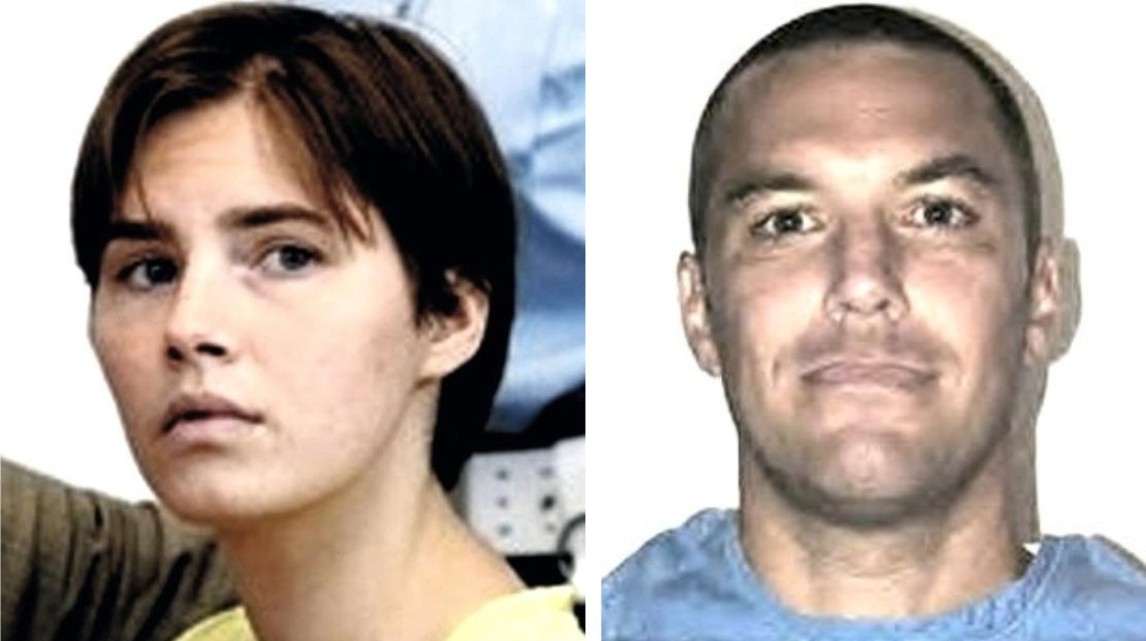
12. Epilogue ““ Master Manipulators
It is curious that the fervent supporters of Amanda Knox do not crusade for the release of Scott Peterson as well. After all, he was convicted on LESS direct evidence, and also in the midst of a maelstrom of publicity. CNN.com had called the Peterson prosecution case so weak and “unimpressive” that they speculated that he could end up with a “Not Guilty” verdict.
But with the exception of his own family, no one has picked up beating the drum to overturn the jury’s conviction of Peterson. Perhaps it is because Peterson doesn’t fit well the damsel in distress role? More likely, it is because the American public trusted the jury’s assessment of the evidence and trial, as they and the American media usually do, and they feel that the jury delivered a just verdict, and justice to Laci and Connor Peterson.
How is it possible that two “regular” people like Knox and Peterson ended up in jail for horrendous murders? Below is a condensed version from an AP article about the type of personality attributed to Scott Peterson:
It is interesting to note that life transitions are tremendous stresses to a psychopath. Psychopaths also wear “false faces” and are master manipulators. They are the ultimate con artists and they are able to fool even those closest to them.
Peterson’s closest friends “never suspected there was a monster inside Scott’s psyche.
Motive still a question in Peterson case
By the Associated Press
Tuesday, December 21, 2004
REDWOOD CITY, Calif. (AP)””Of all the questions surrounding the Laci Peterson murder case, the one that seemed to be running through practically everyone’s mind was this: If Scott Peterson was so unhappy in his marriage, why didn’t he just get a divorce?Experts on the criminal mind say the answer may lie in what lurked beneath Scott Peterson’s charming veneer “”a psychopathic personality.
“When you say you’re going to get a divorce, everyone knows that it’s a long, tedious process. The psychopath wants the short-term solution,” said San Diego forensic psychologist Reid Meloy.
Peterson, 32, was convicted earlier this month of murdering his eight-months-pregnant wife and the fetus she was carrying, and the jury decided he deserves the death penalty.
Criminal psychologists say Peterson appeared to be a master manipulator who lacked the capacity to feel remorse or consider consequences “”some of the same psychopathic characteristics exhibited by serial killers Ted Bundy and John Wayne Gacy.
Psychopaths “tend to con people very well and they wear false faces,” said former FBI profiler Robert Ressler. “They tend to be able to fool everyone from their families to their friends to society, schools, their community.”
At Peterson’s trial, prosecutors portrayed him as a callous liar who continued to carry on an extramarital affair even as police searched for his wife. They said he killed her to escape marriage and impending fatherhood for the freewheeling single life.
Whether Laci’s pregnancy was the catalyst for Peterson’s plan may never be known. But experts said pregnancy can lead to seismic changes within a relationship.
Pregnancy “represents commitment, fatherhood, another dependent, a lifelong bond ... and all of those things are strongly despised by the psychopath,” Meloy said”¦ pregnancy represents a life transition, and there are stresses around that transition.”
Peterson’s case was made all the more perplexing by the lack of signs that the couple’s marriage was in trouble. Although Peterson had cheated on Laci at least three times, according to defense attorney Mark Geragos, he appeared to family and friends to be a doting husband and father-to-be after Laci became pregnant.
Those closest to the couple said they never suspected there was a monster inside.
Heather Richardson, the maid of honor at the Petersons’ wedding, is still hoping for a plausible explanation to emerge. Perhaps, she said, Peterson suffers from a disorder that has yet to be revealed.
“It would be at least comforting. Then I would realize that the person I knew and loved dearly was there. He was that person and the other person, too,” Richardson said. “So at least part of him was not a lie.”
Here is Amanda Knox in her own words talking about masks “” while taking the stand for the final time at her trial in Italy (CNN, Dec. 3, 2009): “They say that I am calm. I am not calm ... I fear to lose myself, to have the mask of the assassin forced upon me.”
This is an update of my post of 24 July 2010
Monday, December 16, 2013
Appeal Session #6: Case For Knox’s & Sollecito’s Guilt - The Civil Parties
Posted by Our Main Posters
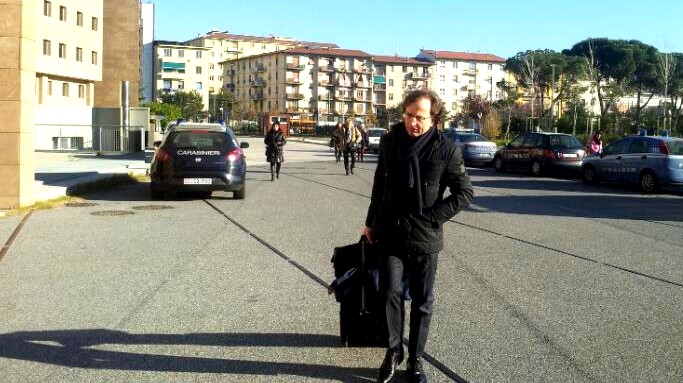
[Above, today: Dr Maresca, the Florence lawyer who speaks for the victim, arrives at the court]
7. Court resumes tomorrow
Court will resume at 9:30 am Italy time with the first of the summations for the defenses. When they conclude, probably in January, the prosecution will have a chance of rebuttal.
6. Reporting in English
Andrea Vogt has posted a detailed report from the court at The Freelance Desk, Scroll down to the heading “Update Dec 1t 2013”
5. Reporting in Italian #3
Amanda Knox and Raffaele Sollecito, accused in the murder of British student Meredith Kercher, were in the grip of a “murderous rage” fuelled by illegal drugs and alcohol, a lawyer for the victim’s family said Monday. Knox, Sollecito and a third person definitively convicted of the crime, Rudy Guede, had “no inhibitions” because of the drugs and alcohol they ingested before murdering Kercher in November 2007, charged Vieri Fabiani.
Only later did the “fear take over” and led to false explanations including a simulated break-in and robbery, and a false accusation against a bar owner in Perugia, where the murder occurred, added Fabiani. A Florence court is trying the case against Knox and Sollecito, who have been on trial twice before for the murder of Kercher. Both have said they are not guilty of the accusations.
Guede was convicted in a fast-track trial and is serving a 16-year sentence in the murder, but Italy’s top appeal court said it was unlikely he acted alone. Knox, who is in the United States and has not returned for this trial, and Sollecito each served two years in prison after a lower court convicted them of murder in 2009. An appeal court overturned those convictions in 2011 and in March, Italy’s highest court sent the case back to the appeals stage over aspects of the evidence it argued had not been properly examined before.
The supreme court ruled that the initial forensic evidence had been wrongly dismissed in the acquittal and a prosecution theory about a sex game that went wrong should be re-examined. Kercher, 21, was found dead on the floor of an apartment she shared with Knox on November 2, 2007. Guede’s DNA was found inside Kercher, on her clothes, and elsewhere in the apartment.
Fabiani said that a motive for the murder was “irrelevant” because the crime was committed while the trio were abusing substances. An Italian prosecutor has requested a 26-year prison term for Knox and Sollecito for the murder, plus a further four years for Knox for allegedly slandering bar owner Patrick Lumumba, whom she initially implicated during tough police questioning before later retracting, saying she had been confused.
The new trial opened in Florence in September, and a decision is expected on January 10.
Translation by The 411
4. Reporting in Italian #2
For the Kercher family it is “intolerable” that Amanda Knox on her website is issuing “invitations to collect donations in memory of Meredith” declared Dr Francesco Maresca, the lawyer for the parents and siblings of Mez, speaking in the Assize Court of Appeal of Florence, where judicial process continues for the murder of the young British student Meredith Kercher, which occurred in Perugia on the night of November 1, 2007 .
Dr Maresca asked the Court “to forget the opposing sides and all that is foreign to the process”, meaning the media coverage of the controversy being generated in the U.S. in the legal defense of Knox, as they should also “forget the statements made in court a few weeks ago by Raffaele Sollecito, who is now returned to a “vacation” in Santo Domingo”
Dr Maresca also pointed the finger at Knox for her book, for which she signed “contracts in the millions” and also retains “a person to handle public relations”. Finally, he invited the Court to also forget “those journalists who are inspired by the freedom of delirium and not the freedom of the press.”
Many elements confirm the original verdict. “We have no doubts about the guilt of the accused - there are so many elements to confirm the sentence”.
The family of Meredith Kercher, said the lawyer, will be in Florence on the day of the judgment of the appeal for the murder of the young British student by the defendants Amanda Knox and Raffaele Sollecito .
This was a heinous crime committed knowingly. “We ask the Court for truth and justice for a heinous crime committed with precise awareness and desire” said the lawyer Vieri Fabiani, one of the lawyers of the Kercher family… “The defendants Amanda Knox and Raffaele Sollecito and Rudy Guede, in the process of killing Meredith Kercher, were “excited and a murderous rage was triggered” because, with the drugs and alcohol taken ” their minds were free of inhibitions”.
Fabiani focused in particular on Rudy Guede also convicted for the murder of Meredith, recalling that the judgment was delivered after the first degree trial in Perugia [in October 2008]. And on the verdict against Guede, Fabiani stated that he was sentenced in collusion with another two who “accidentally” have been identified as Sollecito and Knox, whose responsibility and presence on the scene of the crime are well documented.
Fabiani called Sollecito and Knox persons of “high criminal capacity” who have created the picture of a crime without serious motive. Then after the murder “fear, terror, took over and they set out to simulate a theft, frame Patrick Lumumba, to mystify, however clumsily, to banish from their minds the crime they committed.”
Fabiani argued that the presence of two defendants in the house on Via della Pergola that evening, and their willingness toward murder, were strongly demonstrated.
“The motive becomes irrelevant,” even if it can be identified “in the issues between Amanda and Meredith, which evolved into a sort of punishment of the victim, in an escalation”.
3. Reporting in Italian #1
Amanda Knox, Raffaele Sollecito and Rudy Guede were ” excitedly and this unleashed their homicidal rage ” that tragic night between the first and November 2 of 2007. Vieri Fabiani, one of the lawyers of the Kercher family, during the appeal session in Florence about the murder of Meredith Kercher .
Because of drugs and alcohol their minds were “devoid of inhibitions ,” argued the lawyer, according to whom the defendants should be considered ” persons of a high criminal capacity .” After the murder, fear took over, then they get to simulate a theft, to accuse Lumumba, to mystify to banish from their minds the crime they committed.”
The lawyer explained that the presence of the two defendants at the crime scene and their willingness to commit murder was strongly demonstrated. “The motive becomes almost irrelevant, even though important elements can be identified” in the problems existing between Amanda and Meredith, which “evolved into a sort of punishment of the victim in an escalation”.
For the Kercher family it is “intolerable that Amanda Knox on her website makes invitations to collect donations in memory of Meredith” added the lawyer Maresca. He invited the Court ” to forget the opposing sides and all that is foreign to the process.” The court should “forget” the statements made in court a few weeks ago by ” Raffaele Sollecito who has returned to “a vacation” in Santo Domingo
Avv Maresca also pointed the finger at Amanda and her book thanks to which she ” has signed contracts making her a millionaire.”
2. Tweets from La Nazione
10. Amanda knows the mode of the crime because she was present
9. Motive is irrelevant, the presence of the accused at the scene of the crime is proven
8. Amanda and Raffaele in the grip of the excitement and this triggered the murderous rage
7. It is not sustainable that Rudy Guede is the only murderer
6. The lack of motive is irrelevant, there is evidence of homicidal intent
5. The ruling of the Supreme Court crushed the acquittal of appeal
4. Amanda knew the mode of the murder
3. On the knife found at Sollecito’s house there was the DNA of the victim
2. Contamination of the bra clasp is false (invented)
1. Meredith proceedings: hearing begins. Lawyer Vieri Adriani for the victim family to speak first
1. Tweets from Freelance Andrea Vogt
5. Courtroom nearly empty for closing args of lawyer representing meredith kercher family. Not much interest in their quiet suffering.
4. Maresca: “While we’re here in trial, Sollecito in Santo Domingo & Knox in US taking online donations for victim she’s accused of killing.”
3. Kercher attny Serena Perna: Meredith’s many wounds in many places (from bare hands,from knife, yet not defensive) = multiple attackers.
2. Kercher attny: Motive, or lack thereof, is absolutely irrelevant.1000 different problems could have led to fatal escalation of violence.
1. Right now lawyers for the civil parties (specifically Kercher family) giving closing arguments. Defense is to follow.
[Below: two images in the courtroom from previous sessions]
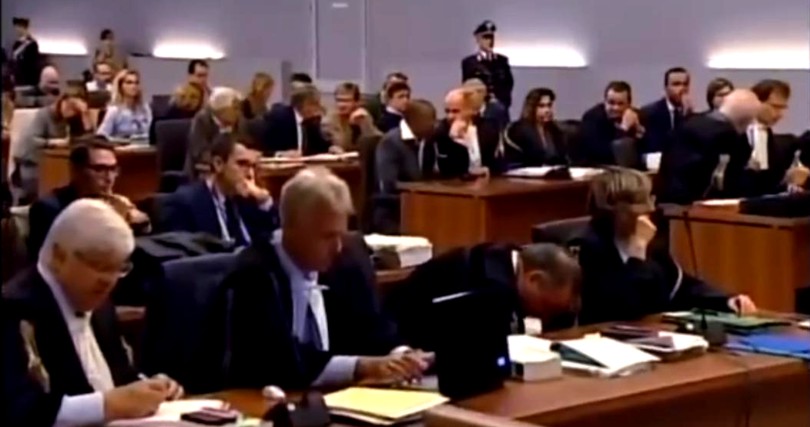
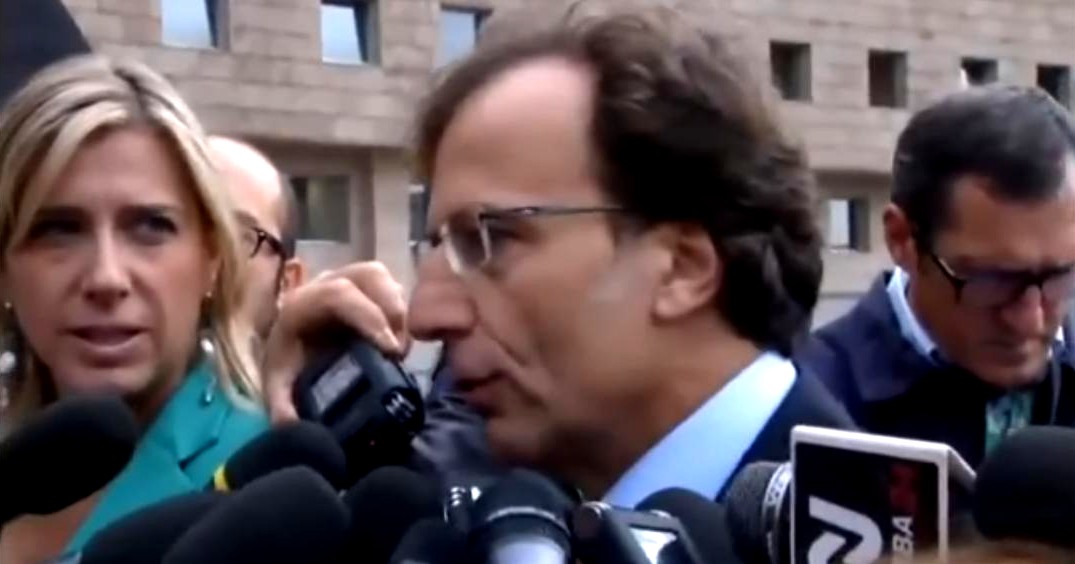
Thursday, December 12, 2013
Why Meredith Might Have Survived If The Attackers Had Cared And Called For Help Very Fast
Posted by Cardiol MD

Malala Yousafzai, world-famous Pakistani victim of a Taliban assassination attempt, survived via a tracheostomy
Absence of full medical picture outside Italy
For this post I wear my medical hat - I am a cardiologist who has had many lives in the balance under my hands.
Parts of the prosecution’s evidence back at trial in 2009 were very stark. Some was presented behind closed doors and with no CCTV feed, although good summaries in Italian appeared in the Italian press.
In Italy the reporting on the trial was several times as deep as anywhere else. There were TV chat shows to review the case as it was being made, and many in Italy read the entire Massei Report when the Department of Justice put it on their website.
Nobody in Italy gives the slightest credence to the theory of the Lone Wolf. Many or most have not even heard about it, and to almost all Italians the idea that Guede could have acted alone (as Knox and Sollecito claimed in their English-only books) would seem absurd.
Many Italians were therefore quick to realize that the Hellmann court did not see the prosecution present its real case, and had been led astray by cherrypicking and innuendo by the defense and an unqualified judge.
In contrast, as I said above, foreign reporting was not deep. The Massei report now being argued against by Knox and Sollecito (yes, this is THEIR appeal) has not yet been carried in English by even one non-Italian media site.
Even the amazing Massei report summary which PMF posters so carefully prepared appeared only here.
How this can affect the January outcome
Among the starkest items of the evidence that are well known in Italy but almost nowhere else are the autopsy findings and the whole-day crime scene recreation testimony.
They were presented (1) only in closed court in mid 2009 and (2) in the attack recreation video shown to the court late in 2009. during Summations. The highly effective video, which took months to get just right, was not entered into evidence and so no jury other than Massei’s has seen it since.
Closing this yawning chasm really matters now because (1) the Supreme Court is in no doubt that Guede did not act alone and (2) the Sollecito and Knox defense attempts to prove one or two other perps staged the attack with or without Guede have fallen off a cliff.
Here is the blunt truth:
- Meredith’s killers at the end inflicted terrible, terrible wounds, and witnessed what she went through.
- There is evidence that Meredith might have SURVIVED if medical help had been called very quickly indeed.
Instead of course her killers cruelly ignored her dying pain, took away her phones, locked her door, and for a while at least they simply went away, while she died.
These truths about the attack and in particular the horrific wounds is relevant both to what Meredith’s killers are guilty-of, and to what sentence would be appropriate if it is confirmed they did the deed.
Brief explanation of the medical facts
While this subject is tough for most people, it has to be viewed objectively by medical-professional care-givers and by judges, and now may be an acceptable time to objectively clarify the subject.
Such information is considered highly relevant in US courts, under Federal Rule 702. Testimony by Expert Witnesses, US state Good Samaritan Laws, and possibly in Italian courts, under Art. 593 of the criminal code ““ Failure to Provide Emergency Assistance.
Even though I can find no references to Failure to Provide Emergency Assistance in the various Motivazioni, many TMJK readers may be interested in this discussion of the subject:
MK’s airway-wound, taken in isolation, was certainly survivable for hours or even days; her superior thyroid artery wound was potentially survivable if simple manual compression was quickly applied there-and-then by anyone present, and urgent professional assistance was then obtained.
MK’s dying occupied at least as much as 15 minutes; it was the combination, and proximity of the 2 wounds that was lethal.
The kind of injury to Meredith’s airway, intentionally inflicted with malicious intent, is well within the spectrum of accidental injuries seen and treated in hospital ERs.
The elective therapeutic procedure - tracheostomy - has consequences very similar both to malicious and to purely accidental airway-injuries.
A tracheostomy is a surgical procedure to create an opening through the neck into the trachea (windpipe).
A tube is usually placed through this opening to provide an airway and to remove secretions from the lungs. This tube is called a tracheostomy tube or trach.tube.
The cutting part of the procedure is called ‘the tracheotomy’; ‘tracheostomy’ is the name assigned when the artificial tube has been inserted.
Tracheostomy is frequently performed in hospitals, all over the world. The subjects of tracheostomy cannot phonate unless the tracheostomy-opening is sealed, typically using a finger to divert the exhaled air through the larynx.
Injuries to the tracheobronchial tree within the chest may occur due to penetrating forces such as gunshot wounds, but are more often the result of blunt trauma. TBI due blunt forces usually results from high-energy impacts such as falls from height and motor vehicle accidents; the injury is rare in low-impact mechanisms.
Injuries of the trachea cause about 1% of traffic-related deaths. Other potential causes are falls from high places and injuries in which the chest is crushed. Explosions are another cause.
Gunshot wounds are the commonest form of penetrating trauma that cause TBI. Less commonly, knife wounds and shrapnel from motor vehicle accidents can also penetrate the airways.
Most injuries to the trachea occur in the neck, because the airways within the chest are deep and therefore well protected; however, up to a quarter of TBI resulting from penetrating trauma occurs within the chest. Injury to the cervical trachea usually affects the anterior (front) part of the trachea.
Notables who survived via a tracheostomy
Many public figures have received tracheostomy in the past. These are perhaps the most well-known:
- Gabrielle Giffords, a Democratic member of the United States House of Representatives received a tracheostomy after being shot in the head.
- Elizabeth Taylor had an emergency tracheostomy for pneumonia in 1961.
- Stephen Hawking (physicist) received a tracheostomy because his muscles of respiration are paralysed by Amyotrophic Lateral Sclerosis (ALS, also known as “˜Lou Gehrig’s disease’)
- Catherine Zeta Jones (actress) when a little girl, contracted a virus that prevented her from breathing normally, and underwent tracheostomy surgery.
- John Paul II (Pope) had an emergency operation after a breathing crisis
Others whose tracheostomy saved their lives
Medical and legal conclusions from this
Repair of Meredith’s airway injury was potentially survivable, given the conditions indicated in the medical text above.
It was the simultaneous severing of her right superior thyroid artery, and the failures not only to seek emergency care, but the abandonment by her attackers that resulted in her death.
The right superior thyroid artery is about the same size as the radial artery of the wrist, which when severed suicidally, leads to a similarly slow death from blood-loss alone.
In Meredith’s case, she inhaled the blood and died less slowly, by coexistent drowning.
The Nencini Court should take her killers’ Failure to Provide Emergency Assistance into account in its decisions, especially if they now try to claim it was just a prank-gone-wrong.
Malala Yousafza who survived via a tracheostomy; the tube is visible below her chin

Sunday, October 20, 2013
Given The Abundant Facts, What Scenario Is The Nencini Court Considering? Probably Not Unlike This
Posted by Marcello

1. The “Innocence/Framing” Campaign
It is rather sad that this case, of the violent murder of Meredith Kercher, has seen a ‘hurricane’ of noise trying to cherry-pick and disprove the more salient facts, and worse, discredit those who investigated, prosecuted and ruled on the case as well as discredit those who continue to emphasize the facts.
Over the past six years there has been a concerted effort by the defendants in this case, and primarily by their families, their “˜groupies’ and their legal consultants, to mount and continue a public relations campaign to frame the defendants as innocent of the crime of murdering Meredith Kercher. This ‘innocence’ campaign has even gone so far as to tarnish the motives of the fine justice officials involved.
The defendants themselves have continuously obfuscated and lied about the more salient facts, albeit inconsistently (their multiple versions fail to match up, and do not match the available facts). Lately Ms. Knox has done a number of (typically unconvincing) interviews, and her parents still seem too intent on defending the fantasy of their daughter’s innocence, all evidence to the contrary.
Mr. Sollecito, for his part, tweets unofficial retractions about statements he made in court. Both have distastefully profited through books that are not much more than a compilation of lies (and which do not offer matching alibis). Meanwhile the legal teams for the defendants have recently leaked “˜favorable’ results from the testing of a new sample on the presumed murder weapon in order to (again) misconstrue the evidence for the general public.
2. Media Misreporting Facilitates
Perhaps the most unfortunate aspect of this “˜innocence campaign’ has been that far too many journalists have dishonored their professional ethics by failing to do the proper research and objectively report the facts. Journalists to this day continue to misreport the facts, leave out corroborating facts, or worse, blindly repeat the distortions or lies promoted by the campaign without proper fact-checking. By and large, journalists (mostly in the US and UK) have ‘anti-reported’ the case.
This is especially grievous given that there are multiple Court Motivations reports (a unique feature to the Italian justice system) readily available in Italian and English online, in searchable PDF format, as well as several websites like this one that have painstakingly sought to illuminate the vast amount of evidentiary facts.
Those journalists who have failed to correctly report the case, and those involved in this ‘innocence’ campaign, have repeatedly disrespected the victim, Meredith Kercher, and her family. By contrast, the Kerchers has shown great dignity throughout these years, remaining patiently quiet and consistently insisting that the truth be revealed by the Italian justice system.
The endless journalistic failures, and particularly the ‘innocence’ campaign, have also disrespected the Italian law enforcement and judicial systems. By contrast Italian law enforcement has demonstrated substantial deference to the defendants, especially when compared to the law enforcement and judicial procedures of other advanced countries. In response, numerous ‘groupies’ have exhibited pathetic jingoism by repeatedly denigrating a country of 60 million people based on rather uninformed attitudes.
And it is very likely that Ms. Knox and Mr. Sollecito, rather than confess the truth, will continue to obfuscate or lie as much as they can, as well as disrespect the Italian Court and the Kerchers by not being present at the appeal. Their ‘innocence’ campaigns will likely continue to distort or ignore the facts. And worse, journalists and talking-head ‘experts’ will continue to report falsehoods and misrepresentations.
3. All Will Now Be To No Avail
Fortunately, none of the fabrications, ill-conceived scenarios or numerous pieces of unprofessional, sloppy journalism will ultimately matter.
This is because the Nencini Appeals Court will not be listening to any of the noise. The Appeals Court has a very specific program to follow, mandated by the Italian Supreme Court, which has already looked at this case four times (the detainment requests for Knox and Sollecito, the conviction of Rudy Guede and the annulment of the Hellmann Appeals Court ruling). The Nencini Appeals Court program includes:
- 1) looking at all the case evidence noted in Judge Massei Trial Court’s Motivations report,
2) considering the Italian Supreme Court’s Motivations report for the conviction of Rudy Guede, in which Guede was convicted of having a role in Ms. Kercher’s murder, but not the key role of fatally stabbing her, and that he acted in concert with others, and
3) considering Ms. Knox’s voluntary “˜gift’ statement of November 6, 2007, in which she placed herself at the scene of the crime. (This statement follows an earlier verbal and written statement released to the police during a few hours of interrogation in the early hours of November 6th.)
4. Big Surfeit Of Evidence
The amount of evidentiary facts the Nencini Appeals Court will have absorbed is substantial. Unlike the Hellmann Appeals Court, they cannot cherry-pick the facts. Per the Supreme Court, they must consider all the available evidence as a whole, logically tied together like a mosaic. Significantly, one could even leave out the knife and bra clasp entirely as evidence points because:
- 1) Ms. Kercher was murdered by more than one assailant. This is evident from the wounds she suffered, from the evidence in general and has been consistently maintained by three different trial judges and four different Supreme Court reports.
2) Guede in all his various confessions has consistently hinted and ultimately confirmed the presence of Knox and Sollecito during the crime.
3) There is no plausible scenario for the crime that involves Guede and two or more unknown assailants.
4) All the other evidence found at the crime scene points to Sollecito and Knox being present before, during and after the crime in some fashion.
5) Knox was at the scene of the crime by her own written admission.
6) The break-in was staged and, by obvious implication, only Knox and Sollecito would have any interest in staging the break-in (see my earlier post listing all the problems with the break-in scenario).
There seems no rational way that the Nencini Appeals Court can logically acquit. And Judge Nencini has not ‘pre-announced’ a non-guilty verdict like Judge Hellmann did by claiming that the defendants “˜appear to be innocent’.
The only remaining questions are what kind of dynamics will the Nencini Appeals Court assign to the participants, and what kind of reasoning will the Italian Supreme Court provide, assuming Knox or Sollecito appeal to the Supreme Court.
Having already read the Massei Motivations report and supporting documentation for weeks, this will already be a highly informed judges’ panel. What scenario are they converging on? The following scenario is based on some of the most significant evidence, and overall seems largely unshakable.
5. Scenario Accounting For The Most Points
The Night Before: Halloween
1) Guede lied about meeting Ms. Kercher on Halloween. (No such meeting was corroborated by witnesses.)
2) Guede lied about his whereabouts in the early evening of November 1, 2007. (His claims of having appointments with friends were not corroborated.)
Evening Prior To Attack
3) Around 8:00 PM on November 1st, Knox left Sollecito’s place to go to work. She received Lumumba’s (her boss) text message around 8:15 PM that she was not needed at work. She responded at 8:35 PM while presumably walking back to Sollecito’s apartment. Then she turned off her phone at 8:35 PM. She was seen at Sollecito’s apartment by 8:40PM.
4) Sollecito received a call from his dad at 8:42 PM. (According to the defendant, they discussed the broken trap in the kitchen sink and how to clean the kitchen floor, and about going to Gubbio with Knox the next day. Significant about this is that the broken trap and clean-up likely happened later. See below.)
5) Sollecito turned off his cellphone at roughly 8:45 PM. (typically, neither Knox or Sollecito turned off their cellphones for the night)
6) Ms. Kercher was last seen by her friend Sophie Purton at roughly 9:00 PM going to her cottage.
7) There was no human interaction with Sollecito’s computer after 9:10 PM.
8) Knox and Sollecito were seen at piazza Grimana, by the cottage, at roughly 9:30 to 10:00 PM, by a homeless man who “˜resided’ at piazza Grimana.
9) Ms. Kercher’s phone made three short calls between 10:00 and 10:15 PM roughly, to check voicemail, a possible attempt to call a bank, and possibly an MMS message.
10) A car broke down near the gate of the cottage at 10:30 PM.
11) Knox and Sollecito were seen at piazza Grimana, by the cottage, at roughly 11:00 PM, again by the same homeless man. He noted they went several times to the railing of the piazza to look down beyond it. (The piazza overlooks the gate of the cottage.)
12) A tow truck came at approximately 11:00 PM to tow the car. The driver of the truck noted a dark-colored car parked in front of the gate of the cottage, which he noted was slightly open. At approximately 11:15 PM the tow truck left and the family in the broken down car departed the area with other friends in a second car. (Sollecito had a dark colored Audi.) No screams were heard and no one noticed Guede, Sollecito or Knox pass through the gate.
13) Sollecito’s dad sent Sollecito an SMS at 11:15PM. The message was not received by Sollecito’s cellphone until roughly 6:00 AM following morning.
The Attack Upon Meredith
14) Knox likely let Sollecito and Guede into the cottage after 11:15 PM, after the tow truck and car had left. Guede went to use the large bathroom and failed to flush his feces. The following is an assumed sequence:
15) Ms. Kercher was restrained in her room and her screams were muffled. (There was bruising on Ms. Kercher’s nose, mouth, lips and chin, suggesting her mouth was covered by one or more persons; only one scream was ever heard from the cottage; Ms. Kercher was familiar with martial arts maneuvers and likely vigorously tried to defend herself)
16) Ms. Kercher was choked and her head likely banged against the wall. (Bruises on Ms. Kercher’s neck suggest she was choked with small hands; Ms. Kercher had bruises to her scalp.)
17) Ms. Kercher’s jeans may have been partially removed to restrain her legs and feet. (There were few bruises to Ms. Kerchers legs and feet, including no signs of ligature. This suggests her legs were immobilized in some other fashion.)
18) Guede held Ms. Kercher’s left wrist, leaving DNA traces on Ms. Kercher’s sweatshirt.
19) Guede likely held Ms. Kercher’s left thigh, brusing it, and left his DNA traces inside her.
20) Ms. Kercher’s sweatshirt was removed and two layers of shirts she had on were rolled up to her neck.
21) Guede left DNA traces on Ms. Kercher’s bra.
22) At least three different types of shoe prints were left on the floor in Ms. Kercher’s room on postcards, papers and the pillowcase. None of these matched Ms. Kercher’s shoes found in her room.
23) A witness heard a man and woman yelling from the direction of the cottage.
24) Ms. Kercher was pricked and stabbed with a small knife in the right side of her neck.
25) Ms. Kercher likely freed her right hand and sustained small cuts. She may have punched Knox in the nose or mouth.
26) Ms. Kercher likely freed her left hand and sustained small cuts. She may have grabbed Knox’s hair, while perhaps ripping off an earring from Knox. (Crime scene photos show blonde hair strands in Ms. Kercher’s left hand)
27) Ms. Kercher was able to scream at the top of her lungs. Two witnesses heard the scream. One witness believed it was around 11:30 PM when she heard it.
28) Ms. Kercher was pricked on her neck and chin with a knife. She was stabbed on the left side of her neck with a large knife. Her neck was roughly 16” off the floor, as suggested by a blood spray pattern on the wardrobe door close to where she was found.
29) A bloody shoeprint fitting Knox’s shoe size was left on the pillowcase. Shoeprints matching Guede’s shoes were also found on the pillowcase.
Right After The Attack
30) Guede may have gone to the bathroom to get two towels to staunch the blood. Guede confessed to this, though no DNA traces of his are found on the towels. Guede’s bloody shoeprints were found around Ms. Kercher’s body, and his bloody hand print was found on the pillow.
31) At this point, Knox may have gone to the small bathroom to check a wound. Knox left traces of her blood mixed with Ms. Kercher’s blood in the bidet, edge of the sink and Q-tip box in the small bathroom. Knox left an additional blood trace on the faucet.
32) Guede handled Ms. Kercher’s purse, leaving DNA traces of himself and Ms. Kercher, likely with Ms. Kercher’s blood. (Traces of Guede’s DNA was found on the zipper of the purse. Because the trace contains blood it was likely left after Ms. Kercher started bleeding.)
33) Guede left bloody shoeprints leading straight down the corridor and out of the cottage.
34) A witness heard someone running on the metal stair of the car park shortly after she heard the scream.
35) The same witness also heard running footsteps on the cottage pebble driveway at roughly the same time.
36) The boyfriend of another witness was bumped into by someone “˜with dark skin’ running up the stone stairs, though the time is unclear.
37) Another witness heard people running in the street that wraps behind the car park.
38) Sollecito likely tossed Ms. Kercher’s cellphones from his car into a nearby garden 1 km away from the cottage at around midnight.
39) Guede was seen at the Domus night club around 2 AM.
Evidence, Manipulated Or Overlooked
Likely sometime later during the night Sollecito and Knox returned to the cottage to eliminate evidence and frame Guede for the crime. In so doing:
40) Sollecito left a partial bloody footprint on the bathmat.
41) Sollecito left his DNA on Ms. Kercher’s bra clasp after removing the bra. (Given blood patterns on the bra, the bra may have been removed after Ms. Kercher had died and certainly after she had been stabbed on the left side)
42) Sollecito left one, possibly two, bloody footprints in the corridor.
43) Knox left two bloody footprints in the corridor. One of these contained her blood as well as Ms. Kercher’s blood. (Knox likely bled during or after the assault and may have stepped in her own blood)
44) Knox left a trace of her blood mixed with Ms. Kercher’s blood on the floor in Romanelli’s room.
45) Knox likely threw Romanelli’s clothes on the floor. She likely used an inordinately large rock to break the window with the outer shutters closed. She likely placed some of the broken glass on the window sill to fake a break-in. (Romanelli and the Postal Police found glass on top of Romanelli’s clothes and laptop, suggesting the room was ransacked and then the window was broken.)
46) Knox, perhaps inadvertently, left a piece of window glass in Ms. Kercher’s room.
47) Knox left a bloody footprint in her room.
48) Knox likely left her only room lamp in Ms. Kercher’s room by accident. (The lamp was found on the floor, by Ms. Kercher’s bed, and it may have been used to exam the bloodied floor around Ms. Kercher’s body to remove evidence, such as perhaps an earring and/or hair.)
49) Knox likely wiped away all her fingerprints throughout the entire house (While a number of fingerprints were found in the cottage and verified belonging to the three other flatmates, no fingerprints were found that could be matched to Knox, not in her room or elsewhere- except for one, on a glass in the kitchen.)
50) Knox and/or Sollecito repositioned Ms. Kercher’s body and covered it with the duvet. (Crime scene photos show from the streaks of blood that Ms. Kercher’s body was moved. There were masses of long hair mixed with blood on the floor, suggesting someone had yanked Ms. Kercher by her hair.)
51) They likely took Ms. Kercher’s wallet, closed her bedroom door and locked it.
Back At Sollecito’s Place
52) Sollecito and Knox returned to Sollecito’s place to clean up. They brought back the large knife and cleaned it with steel wool, and also tried to scrape away build-up/rust by the handle. (The knife was found at Sollecito’s place, with DNA traces of Knox on the handle and by the handle/blade joint, with a DNA trace of Ms. Kercher on the blade, with scratches on the blade and pockets of cleaned stainless steel by the handle.)
53) Sollecito likely disconnected the trap of his kitchen sink, perhaps to clean it. (The trap pipe was found disconnected.)
54) Sollecito and Knox likely used bleach to clean the floor of any blood. (Police observed a strong smell of bleach when entering Sollecito’s apartment.)
55) Sollecito and Knox apparently took a shower. (Knox has recounted a number of “˜ear cleaning’ and ‘shower’ stories.)
56) Sollecito likely put blood stained clothes and shoes into one or more garbage bags and drove in the night to dump them somewhere.
57) Sollecito used his computer at around 5:30 AM and turned on his cellphone at around 6AM.
Events On The Next Morning
58) Knox was seen at a nearby store at around 7:45 AM, just as the store was opening. She was noticed going to the cleaning products section, wearing clothes that were ultimately found on her bed at the cottage.
59) Knox may have traveled back and forth from the cottage with a mop and/or garbage bags. (In her different versions, both verbal and written, she talks about ‘having to fetch a mop from the cottage’.)
60) Knox turned on her cellphone around noon.
The Police At The House
61) Knox and Sollecito were discovered at the cottage by the Postal Police at around 12:30 PM.
62) Knox told the Postal Police that Ms. Kercher sometimes kept her door closed. (This was later contradicted by Romanelli, who insisted Ms. Kercher’s door be broken down.)
63) Knox called her mother in a panic at roughly 12:45 PM. Knox would later forget this phone call in her testimony and in her book.
64) Sollecito called the Carabinieri at around 12:50 PM, confirming nothing was stolen in Romanelli’s room, though he could not have possibly known this for certain.
65) When Ms. Kercher’s door was broken down, at around 1:15 PM, Sollecito and Knox were not with the group that broke the door down, and were not able to see inside the room.
66) Knox panicked when it seemed that Guede’s feces had been flushed by accident.
Later That Same Day
67) At the police station, Knox yelled out that Ms. Kercher “˜bled to death’.
68) At the police station, Knox inveighed against “˜those bastards’ after being fingerprinted, though it’s unclear whether she meant some other killers (and if so, why the plural), or the police.
One Day Later
69) On November 3, 2007, Sollecito lied to a reporter about how the discovery of Ms. Kercher’s body happened, recounting that Knox was the first to discover the body, and that he ‘saw blood everywhere’ even though he could not have seen into the room.
Two Days Later
70) On November 4, 2007, Knox emailed a narrative of the events from her point of view.
71) During the autopsy of November 4th, the prosecutor was convinced by the number and manner of the injuries on Ms. Kercher’s body that there had to be more than one assailant.
72) On November 4, 2007, Knox broke down when police showed her and the other roommates the knives in the silverware drawer at her cottage, to determine if any knives were missing. Knox had to be escorted outside to calm down.
73) Knox would later confess to her parents her concern about the knife at Sollecito’s apartment.
Three Days Later
74) On November 5, 2007, Sollecito failed to back up Knox and changed his alibi when confronted with cellphone records. He maintained Knox left his apartment from roughly 9:00 PM to 1:00 AM.
Four Days Later
75) On November 6, 2007, following Sollecito’s interrogation, Knox blamed Lumumba for the murder, first verbally, then in one written statement, then in a second statement that she offered voluntarily without coercion.
76) Knox failed to make an official retraction of her blaming Lumumba for the murder.
And Subsequentially
77) When first contacted by his friend via Skype, Guede spoke of a man with a knife who was shorter than he, and who had chestnut colored hair (like Sollecito). He also thought Knox was arguing with Ms. Kercher.
78) When Guede was arrested, Sollecito was concerned that Guede might say strange things about him. (If Sollecito was innocent, why be concerned about Guede?)
79) In their multiple “˜confessions’, both Knox and Guede cite Ms. Kercher’s “˜terrible screams’.
80) In court, as a response for finding Ms. Kercher’s DNA on the knife, Sollecito made up a story of pricking Ms. Kercher’s hand while cooking and subsequently apologizing to her about it. But Ms. Kercher had never been to his apartment. Sollecito recently retracted this story on Twitter.
81) Guede eventually confirmed that Sollecito and Knox were with him on the night of the murder.
Some Further Considerations
Ms. Kercher was not promiscuous and had scruples about watering the marijuana plants of the boys residing on the ground floor of the cottage. She had never expressed any interest in Guede to any of her closest friends. Similarly, Guede had never expressed any interest to any of his friends or acquaintances regarding Ms. Kercher.
Some 40+ wounds were found on Ms Kercher’s body. Despite being physically active and knowing martial arts maneuvers, she had few defensive wounds, mostly on the right hand.
She had bruising on her back, her left thigh, lower right leg, both elbows and wrists, the neck, the nose and mouth. She had two significant stab wounds of differing size on opposite sides of the neck, as well as various cuts on face, neck, hands.
No ligature marks were found on her ankles or wrists. She was therefore assaulted by multiple attackers. And as the evidence and trial reports have repeatedly indicated, the attackers were Knox, Sollecito and Guede, with Guede not responsible for the fatal wound.

